RABBI RETIRES
Rabbi David Pinkwasser reflects on 50 years in the rabbinate


GOING SOLAR
Nonprofit Solar United Neighbors has a co-op for homeowners interested in solar power


Rabbi David Pinkwasser reflects on 50 years in the rabbinate


Nonprofit Solar United Neighbors has a co-op for homeowners interested in solar power

In 2001, ninth-grader Shulamit Izen, an out Jewish lesbian who felt isolated in her suburban Boston Jewish high school, decided to start a gay/straight student alliance (GSA) in her school. The struggle she faced convincing her fellow students, teachers, principal and broader Jewish community to accept her on her own terms was chronicled four years later in “Hineini: Coming Out in a Jewish High School,” a documentary produced by Keshet, a national organization working for the full equality of all LGBTQ Jews and their families in Jewish life.
At a late April gathering of LGBTQ+ Jews and their allies at Scottsdale’s Congregation Beth Israel (CBI), organizers played a long clip from the film showing Izen’s attempt to convince classmates to join her proposed GSA; her awkward exchange with her Orthodox rabbi/principal, who said he didn’t “want to hear about her sex life”; and the decision by one of her closeted gay teachers to come out at the big school/community meeting Izen’s quest ultimately necessitated.
While each issue was particular to that time, that school, that community, when it came to bringing together a current panel of local Jews to discuss “LGBTQ+, Identity & the Jewish Community,” Rachael Kaplan-VanLandingham, CBI’s director of youth education and engagement; Jesse Edwards, religious school coordinator at Paradise Valley’s Temple Solel; and others found several aspects of Izen’s battle still germane today.
“Unfortunately, a lot of the issues are still incredibly


Federal Communications Commission (FCC) Chairwoman Jessica Rosenworcel joined Phoenix Mayor Kate Gallego on Tuesday, May 9, as the mayor announced “an aggressive new effort to close the digital divide and connect more Phoenix residents to high-speed internet in 2023.”
Rosenworcel appeared at the Phoenix Public Library’s Burton Barr Central branch as part of her nationwide tour promoting the federal government’s Affordable Connectivity Program (ACP), which offers a monthly discount of up to $30 on broadband services to qualifying low-income households.
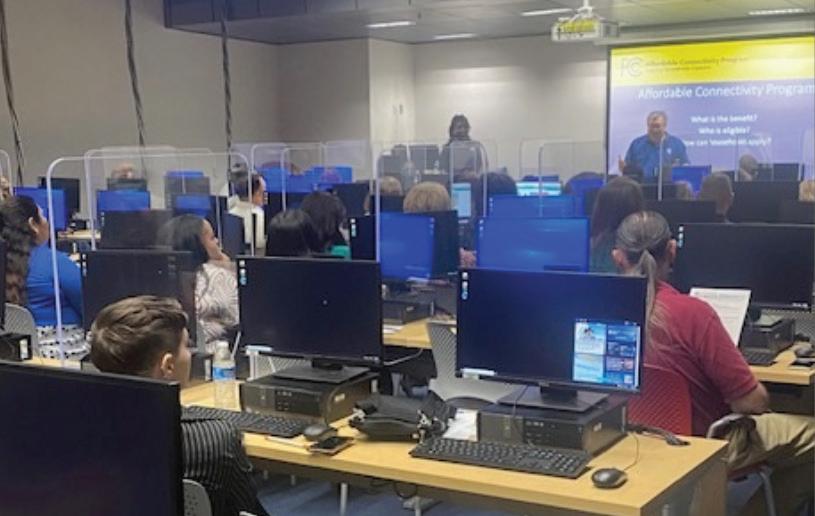
To be eligible for a discount, Arizonans must have an income of no more than 200% of federal poverty guidelines ($60,000 for a family of four), or if one or more members receive other government assistance, including Supplemental Nutrition Assistance Program (SNAP), Women, Infants & Children (WIC), Medicaid, Supplemental Security Income, Federal Public Housing Assistance, Veterans Pension and Survivors Benefits or free or reduced-price school lunch. Additionally, there is a one-time discount of up to $100 to purchase a laptop, desktop computer or tablet from qualifying providers.
Before introducing Rosenworcel, Gallego touted the City of Phoenix’s recent $700,000 outreach grant from the FCC to support efforts to raise awareness and encourage local enrollment in the ACP program.
SEE CONNECTING, PAGE 3
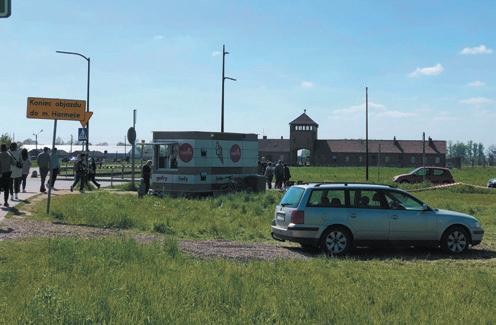
Since May is Mental Health Awareness Month, Dr. Raun Melmed shares tips if your child is being bullied or bullies others. See page 8.
isn’t just politics, it’s tikkun olam, says Jewish FCC chairwoman
One element of the documentary in need of an update, according to Rubenstein, (other than the hairstyles, clothing and dependence on a landline phone) was the pushback from Izen’s classmates. From what she’s witnessed in her years of working with Jewish teens, they are more accepting of their LGBTQ+ peers now.
On the other hand, GLAAD, an LGBTQ advocacy group, released a survey in 2019 showing less than half of people ages 13-34 are comfortable with LGBTQ+ people. Apple added that some of the homophobia, sexism and antisemitism she faced in her public high school in the last few years “was tough.”
One of the evening’s stated goals was to “promote greater understanding and acceptance of LGBTQ+ individuals, those
CONNECTING
CONTINUED FROM PAGE 1
“Everyone in our community deserves access to the internet: Small business owners, schoolchildren, remote work and telehealth are all vital services that are merely a link away in today’s day and age. We learned that lesson during the COVID-19 pandemic,” said Gallego. At the onset of the pandemic, the City of Phoenix collaborated with school districts (elementary, high school and community college) to address the educational needs of students who lack internet access.
Rosenworcel, who is Jewish, is the first woman to hold the FCC chair position permanently. She first worked at the FCC from 1999 to 2007 before returning in 2012 when she was named a commissioner by President Barack Obama.
She has been a strong defender of net neutrality, which bars internet providers from charging websites to reach customers faster, and has cited the Jewish value of tikkun olam, which means repairing the world, in defending the concept. First adopted by the FCC during the Obama administration, net neutrality rules were rolled back under President Donald Trump.
“We share the belief, common to both Catholic social teaching and the Jewish tradition of tikkun olam, that a little ruckus in service of human dignity and the common good is a good thing,” she told the U.S. Conference of Catholic Bishops in 2017. “So let me make a little ruckus today. I’ll start — and get right into it — with net neutrality.”
She made the comparison in an attempt to explain how an aspect of public policy connected to her personal background and “the spirit of tikkun olam,” she told Jewish News.
“If you’re in public policy or public office, you’re going to have to be an optimist and you’re going to have to believe you can keep building, fixing and addressing problems. And a problem that I see clearly is that we have a digital divide in the United States and programs like the
with diverse identities and those who are Jewish.”
For that to happen, people have to show up for discussions like these, which Kaplan-VanLandingham said is only the first in what she hopes will be a series.
“What we need now is vocal, active support, not passive, silent support,” Goodsell said.
Cantor Ross Wolman, panelist and founder of AZ Jews for Pride, acknowledged the importance of coming to such a gathering — to step forward, make space for this population and make one’s allyship known.
“Those who choose not to support us are letting themselves be known by their silence,” he said.
Rubenstein also stressed that ignoring
LGBTQ+ issues is not a neutral position. Just as Izen was silenced by her principal, who thought she wanted to talk about her sex life, Rubenstein was accused by her high school classmates of bringing pornography to school when they spied her reading The Advocate, a gay-rights magazine. LGBTQ+ rights is not a sexuality issue, it’s an issue of human rights, she said.
“When we don’t discuss it, we are taking a side — the side of oppression. By choosing to stay silent, we’re speaking very loudly,” she said. JN
For more information on AZ Jews for Pride, visit jewishphoenix.com/organization/ az-jews-for-pride.

currently enrolled in the ACP program. Enrollment has been hindered because many eligible people still don’t know about the program, and the process of signing up — which requires submitting private information online, by mail or on the phone with an internet service provider — can seem overly cumbersome.
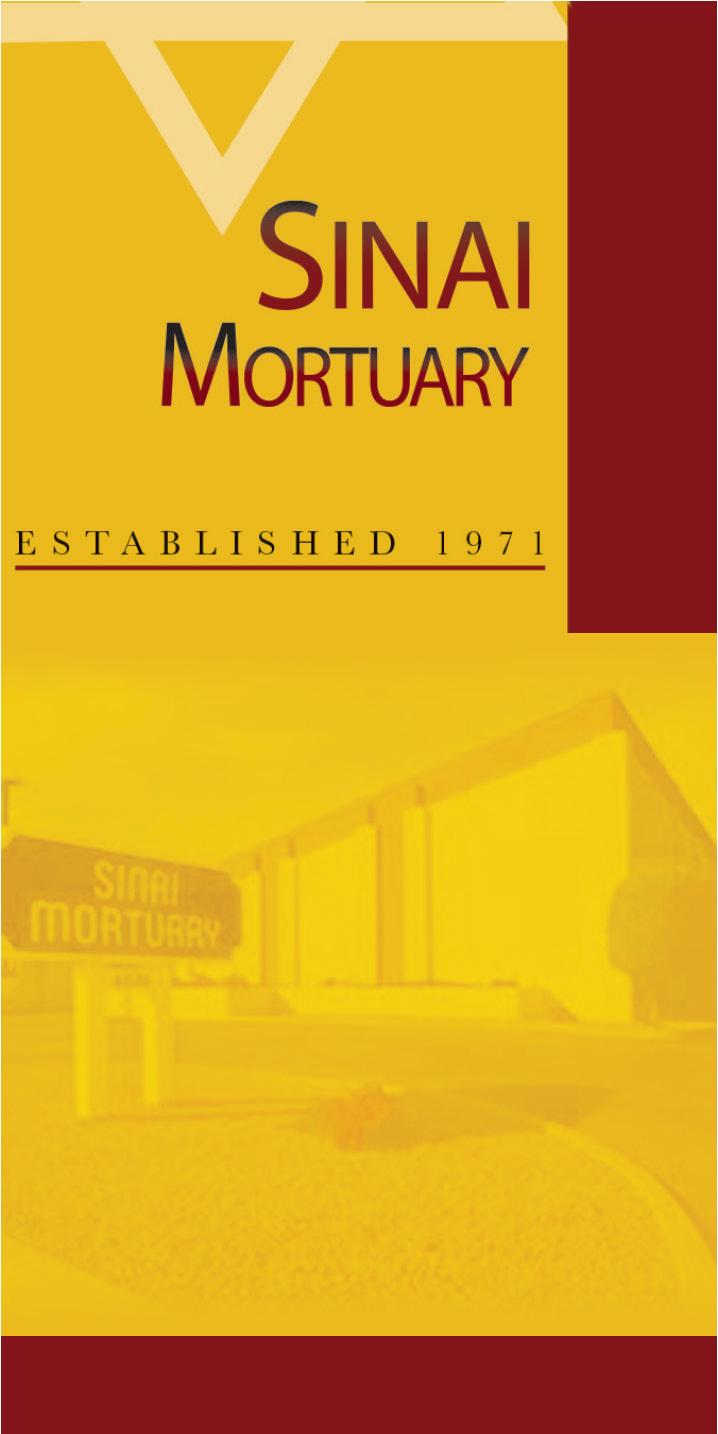
Tuesday’s event attempted to overcome some of those obstacles.
“Together with businesses, school districts and community organizations, the city of Phoenix will double down on its focus to connect workers and students to affordable high-speed internet,” said Gallego.

affordable connectivity program address it, and I want to champion it with all my might,” she said.
Gallego, who is also Jewish, is inspired by Rosenworcel’s passion.
“It’s just very inspiring for us to have a leader of the chairwoman’s caliber taking on connectivity and we love having great Jewish representation in the administration,” she told Jewish News.

Rosenworcel has also made the “homework gap,” a term she coined to refer to those children who need the internet to do homework but lack an adequate internet connection, a focus of hers at the FCC. To address that gap, she has pushed for increasing highspeed internet access in rural parts of the country. When schools closed during the pandemic, she called for the FCC to provide Wi-Fi hotspots to schools to be loaned out to students who lacked an internet connection at home so they could continue to attend online classes and submit assignments.
The ACP aims to increase access across the board. The Biden administration pushed for expanding broadband accessibility as part of its infrastructure bill, recognizing both Americans’ reliance on home networks and the digital divide that exists in both urban and rural areas. More than 16 million U.S. households are
After the introductions, the FCC trained 60 volunteers to assist people in completing ACP applications. There will be in-person sites throughout Phoenix’s libraries, job centers and community centers, in addition to community colleges and Phoenix public schools, the mayor said. A 24/7 website and call center will also be available, especially for those late nights “before a major homework deadline,” quipped Gallego.
Petra Falcon, leader of the Latino and immigrant nonprofit Promise Arizona, was excited to get started. Her organization will build a field campaign to get eligible people to sign up.
“We like to go door to door and talk to people making sure they get linked up. Wi-Fi connectivity is really important for this population,” she told Jewish News.
Estimates are that the current funds for the ACP will dry up sometime in 2024. The program has bipartisan support, but it is up to Congress to decide whether the program gets funded again.
If the ACP disappears, Falcon said she will turn to state resources. Additionally, eligible consumers will have access to the FCC’s Lifeline Support program, which provides a $9.25 discount for broadband services. JN
Rabbi Emeritus David Pinkwasser will join Temple Emanuel of Tempe (TEOT) Rabbi Cookie Lea Olshein on the bimah June 9 to celebrate his 50th anniversary as a rabbi.

“I just couldn’t imagine letting his 50-year milestone in the rabbinate go uncelebrated,” Olshein told Jewish News. “Rabbi Pinkwasser was Temple Emanuel’s rabbi during its formative years and so many congregants whom he has helped, either as their teacher, pastoral counselor or the officiant at their family’s life-cycle events, are still here.”
Pinkwasser had already planned his sermon a month before the celebration. The week’s Torah portion, Parshah B’haalotcha, tells the story of the second Passover offering, a second opportunity God gave to those who were prevented from offering the original Passover sacrifice because they had been unclean.
In other words, the retired rabbi will talk about second chances, something he knows a bit about.
More than a half century ago, Pinkwasser entered the seminary, but not as the culmination of a long-held desire to become a rabbi. Though he grew up in a heavily Jewish part of the Crown Heights neighborhood in Brooklyn, New York — halfway between Union Temple (Reform) and the Brooklyn Jewish Center (Conservative) and close to the home and office of Rebbe Menachem Mendel Schneerson, leader of the Chabad-Lubavitch movement — his dream was to become an interpreter for the United Nations, which is why he majored in Spanish. (Spanish is only one of the eight languages he speaks.)
In the early 1970s, when he was finishing his first college degree, however, the United States was at war in Vietnam and being an interpreter, “the most glamorous job for a language major,” wouldn’t keep him from being drafted. Neither would becoming a college professor, his second choice, nor a high school teacher, his third.
“The next thing down the list was to become a rabbi. It was on my list, but it was not at the top of the list, not even close,” he told Jewish News.
Pinkwasser chose an Orthodox seminary, even though he was raised Conservative, because it worked better with his tight schedule. He taught high school until 12:30 p.m. Monday through Thursday, took seminary classes until 5 p.m., all while teaching night school twice a week and getting a master’s degree in Spanish at New York University.
“I just can’t imagine doing all of that again!” he laughed, remembering that time of his life and wondering how he held it together.
After being ordained in 1973, Pinkwasser wanted to be a chaplain and work with older adults rather than in a congregation. Jobs were scarce, however, so he taught high school until his wife convinced him to move to Arizona, a place they knew through visiting family in Scottsdale.
He looked for a teaching job but all the openings were in special education, something he wasn’t familiar with. Still, Pinkwasser applied, was interviewed and got the job.
The first year, Pinkwasser and his wife joined his inlaws at Temple Beth Israel (now Congregation Beth Israel) for High Holiday services, “and we really liked it,” he said.
When he took his nephew to bar mitzvah lessons the head of Beth Israel’s religious school asked him if
he would be interested in starting a special education Hebrew program. He agreed and taught two afternoons a week after work.
“It soon got so popular, we went to four days a week for three hours a class instead of two, and people were flocking from other congregations because there was nothing else like it,” he said.
Pinkwasser was living in Tempe in 1976 when TEOT was created. Initially, it was known as a Conservative/ Reform congregation. A student rabbi from Hebrew Union College in Los Angeles came every other week to lead services and Pinkwasser and other members of the congregation would trade off leading the off-week services.
“He was very active in bringing our synagogue into the Phoenix Jewish community,” said Shelley Stern, a TEOT past president. “In his day, we were pretty isolated. The roads were not what they are today, and to get into Phoenix, where everything was, was quite a distance — we were sort of the stepchild. But Rabbi Pinkwasser made it his business to try and bring us into the Greater Phoenix community.”
In the second year, TEOT had a small identity shift and became the Reform/Conservative congregation; by the third year, Conservative was dropped entirely and it was a fully Reform congregation.
“The transition over to Reform was very slow and very appealing to me,” Pinkwasser said.
In 1977, Rabbi Marvin M. Reznikoff became the senior rabbi but retired two years later due to ill health. Michael Ginsburg, TEOT treasurer in those years, had hired Pinkwasser to be the associate rabbi in 1978. When Reznikoff left, Ginsburg, his wife, Laurel, and Pinkwasser and his wife, Ann, went to dinner. Ginsburg drove them all home and in the driveway, he turned to the backseat where Pinkwasser sat and asked, “Would you like to be the senior rabbi?” It was all sealed with a handshake.
“He was a natural,” Ginsburg said. “He came right in and took over everything like he’d been doing it for years.”
Additionally, Pinkwasser was offered a contract to spend five days a month visiting every prison in the state where he could support Jewish prisoners.
“Fortunately, we made up only one half of 1% of the prison population,” he said.
He was also actively involved with and even the president of the Tempe Emergency Assistance Ministry, an interfaith organization. He laughs when he remembers how he became part of the group. It all started before Rosh Hashanah one year. A man came to the temple’s door and introduced himself as the leader of the Lutheran Church nearby and wanted to talk about planning an ecumenical Thanksgiving. But being the busiest time of the Jewish year, Pinkwasser told him he’d have to come back earlier the next year. He didn’t expect to see him again.
The next August, however, the pastor came back and Pinkwasser went to the meeting with the rest of the ministers. They held the interfaith event and Pinkwasser and his wife were invited to the pastor’s house, then the reception and before he knew it they had become friends — and still are.
Pinkwasser also gave the group a crash course in the best way to raise money for their charitable work, and the donations tripled.
“The plate came back with $1,400 (a year earlier they
collected $400). They turned around and pointed to me and said, ‘You’re our president,’” he said.
“Once you get past the theology, we were all interested in helping sick people, poor people and being there to support each other,” he said.
In 1998, more than a decade later, Pinkwasser resigned his position as TEOT’s rabbi. All that was left was to figure out what he was going to do with the rest of his life.
“Most people who leave a congregation become a teacher or a chaplain, but I said, ‘OK, I’ve been there, done that,’” His wife encouraged him to do something he had always talked about instead: become a flight attendant.
“I said, ‘I’m almost 50 years old. They’re not looking for an old guy.’ But she said, ‘If they don’t want you, they won’t hire you.’ So I went for the interview and they hired me instantly.”
He spent the next 22 years as a Southwest Airlines flight attendant. Additionally, he was on the critical response team and worked with crews dealing with traumatic events. His rabbinic training was useful in a crisis. But that wasn’t what he loved most about the job.
“I told jokes and sang songs and I did all kinds of fun things, and I probably would have still been there if not for COVID,” he said.
He left Southwest during the pandemic and now Pinkwasser and his wife spend their time traveling and visiting their sons, Josh and Aaron, and grandson, Evan. They are enjoying themselves immensely.
The couple lives in Chandler and have spent the last 48 years in the East Valley. Those years have been filled with adventure, unexpected opportunities and many second chances. That’s part of what he is going to say when he has the chance to stand in front of the TEOT congregation once again.
“Judaism teaches us to keep pushing ahead, to keep trying. If you can’t do it the first time, try an alternative route, but always go within the framework of Judaism because the end result is blessings in your life,” he said. JN
40-CLASS SERIES
40 Great Philosophers & what they mean for Judaism!

Rabbi Dr. Shmuly Yanklowitz

Beginning Mar. 21, 2023 Tuesdays @ 10:00 am PT
Soft as a Reed: Comfort and Flexibility in Receiving Torah Rabbi Sarit Horwtiz
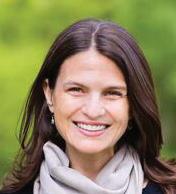

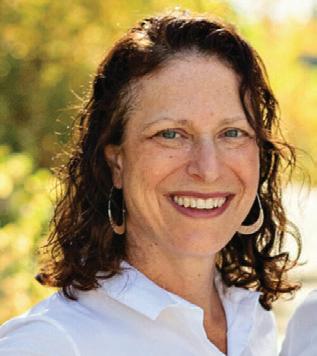





Is Territory Sacred? Unexpected Kabbalistic Teachings for an Age of Religious Conflict

Dr. Nathaniel Berman
Thursday, June 15, 2023 @ 1:00 pm PT
George Washington’s Vine and Fig Tree: Micah 4:4 and the Religious Character of the American Republic


Dr. Aaron Tugendhaft
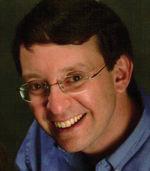
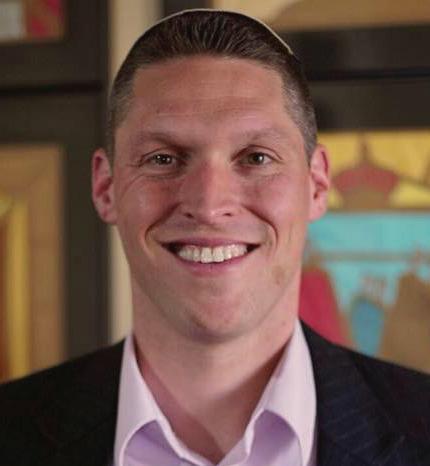

Thursday, July 6, 2023 @ 1:00 pm PT
Reading Matthew from a Jewish Perspective

Dr. Amy-Jill Levine and Dr. Marc Brettler


Thursday, August 10, 2023 @ 1:00 pm PT
Jewish Diversity in Medieval Jewish Babylonia: Beyond Rabbanites and Karaites
Eliyahu Freedman

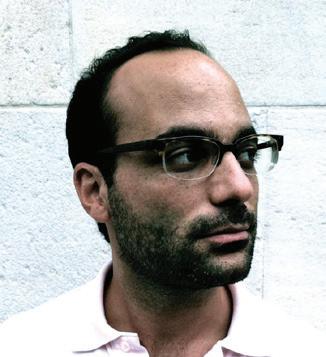
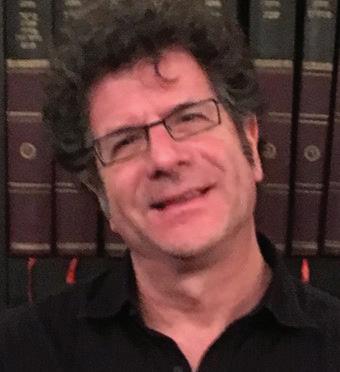
Thursday, August 31, 2023 @ 10:00 am PT
Mystical Hebrew Letters

Dr. David Sanders
Thursday, October 19, 2023 @ 1:00 pm PT
Debut Fiction and the Holocaust: When Fiction Steps in for History


Martha Anne Toll
Thursday, September 7, 2023 @ 1:00 pm PT
Finding Light in Darkness
Melanie Gruenwald
Thursday, December 7, 2023 @ 1:00 pm MT
Tov! — What I’ve Learned About Jewish Ethics By Studying The Good Place
Rabbi Jonathan Spira-Savett
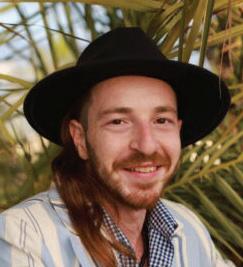
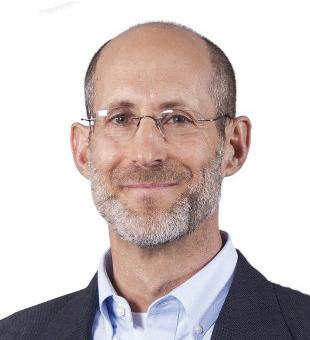

Thursday, June 1, 2023 @ 1:00 pm PT
The Gifts of Imperfection: Brene Brown through a Kabbalah Lens

Melanie Gruenwald
Thursday, September 21, 2023 @ 1:00 pm PT
Introduction to Dreams and Kabbalah
Dr. David Sanders
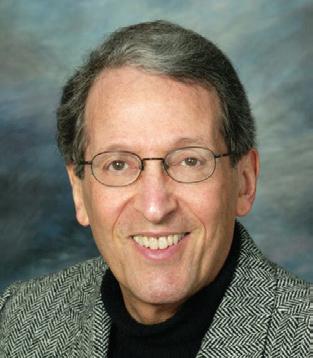
Thursday, January 4, 2024 @ 1:00 pm MT
History of Jews in Uganda & Their Sukkot Experience
Rabbi Gershom Sizomu
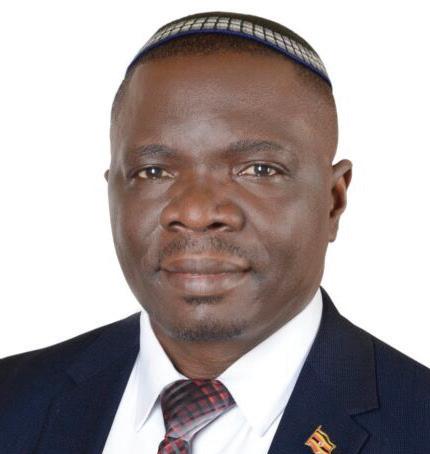
Thursday, October 5, 2023 @ 10:00 am PT
Sherman Minko Memorial Lecture


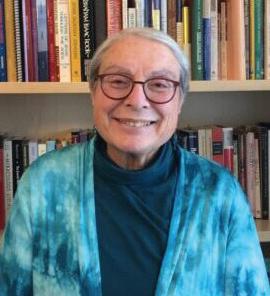

Rabbi Sharon Brous
Thursday, February 22, 2024 @ 7:00 pm MT
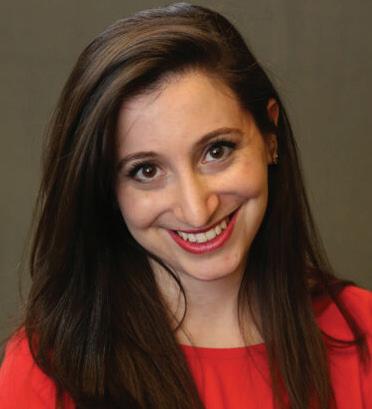
Co-Sponsored by AZJHS and Red Rocks Music Festival Present
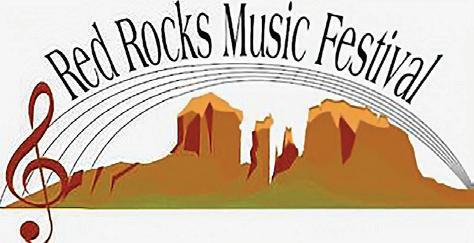
Whether leading the Tamir Hendelman Trio or as a long-time member of the Je Hamilton Trio and the Clayton-Hamilton Jazz Orchestra, award-winning pianist-composer Tamir Hendelman is known for his dynamic and sensitive touch, and his imaginative arranging. Tamir Hendelson has toured and recorded with Natalie Cole, Barbra Streisand, Roberta Gambarini, and in duo with Tierney Sutton, in venues from the US to Europe to Japan.
As a youth, he moved from Tel Aviv to Los Angeles, winning Yamaha’s national keyboard competition, performing in Japan and the Kennedy Center, attending Tanglewood in 1998 and receiving a Bachelor of Music Composition from the Eastman School of Music in 1993.
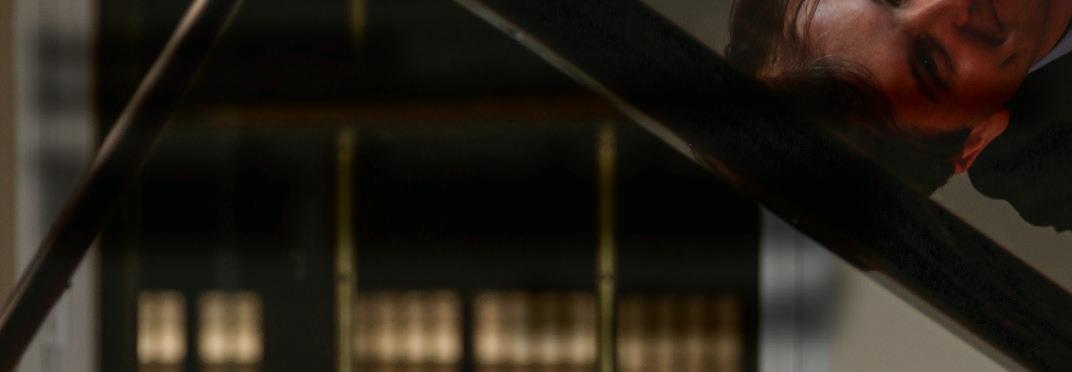
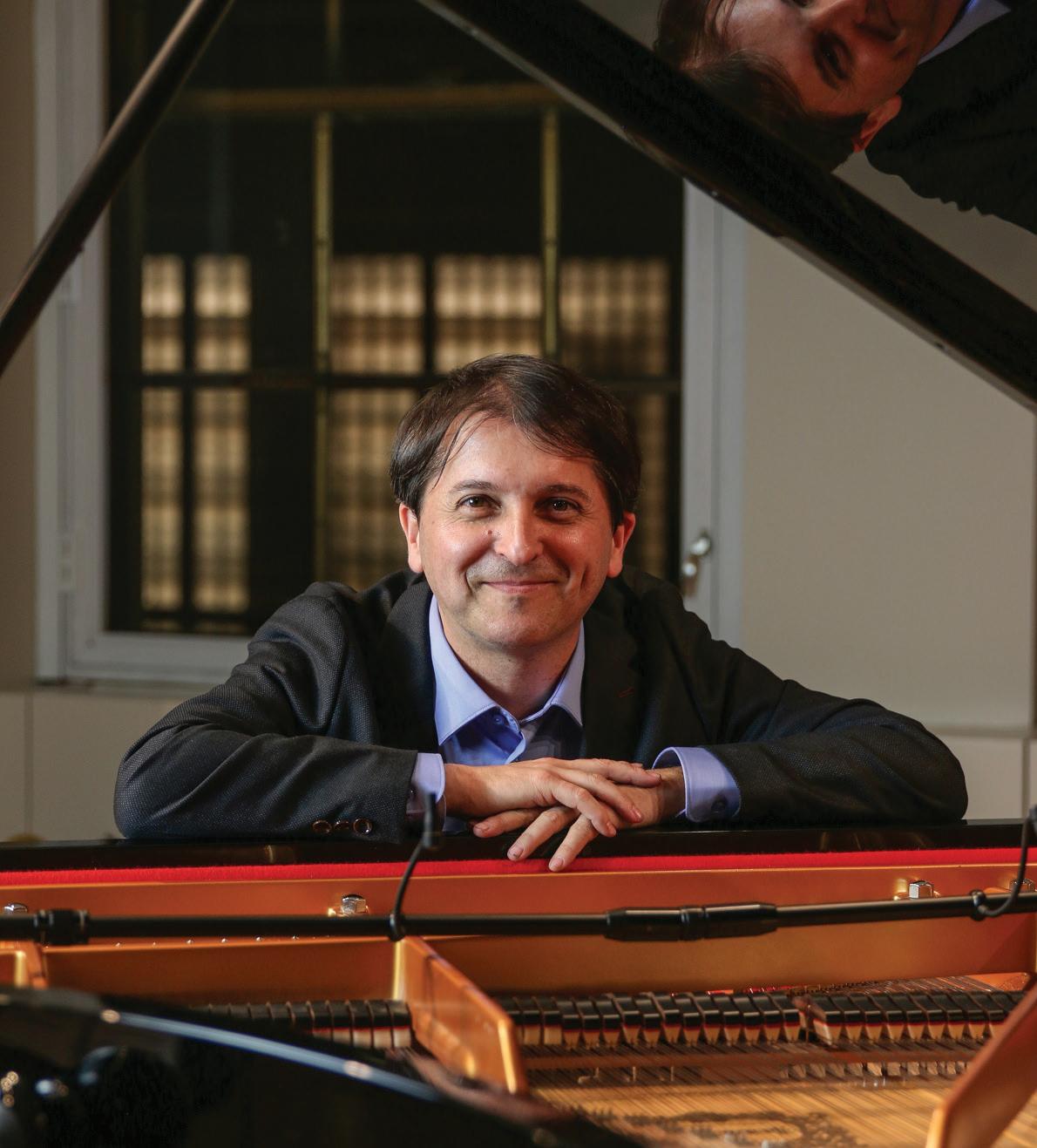
His own latest trio recording, Destinations reached #1 in the US jazz charts and explores his musical in uences, while his rst recording, Playground features him with John Clayton and Je Hamilton with whom he has performed in the Clayton-Hamilton Jazz Orchestra since 2001. Tamir Hendelman appears on recordings by Paul McCartney, Michael Buble and Diana Krall. He has performed with Benny Golson, Eddie Henderson, Houston Person, James Moody and Sean Jones and has recorded and arranged for Richard Galliano, Lori Bell, Graham Dechter and Claudio Roditi.
Sunday, June 11 3 PM
 SHANNON LEVITT | STAFF WRITER
SHANNON LEVITT | STAFF WRITER

Red-and-white checkered tablecloths, strings of white lights and a recording of Dean Martin singing, “When the moon hits your eye like a big pizza pie, that’s amore ,” all helped give the playground of Pardes Jewish Day School the facade of a cozy Italian bistro, an apt setting for “The Rabbi Slurps Spaghetti,” PJ Library’s fundraiser on April 23.
The chance to cheer on nine Greater Phoenix rabbis and synagogue representatives, each racing to be the first to finish a big bowl of spaghetti, brought 175 parents and kids to the slurping spectacle. Before any pasta was served, kids warmed up by playing “pin the meatball on the spaghetti,” making various crafts from colored pasta and writing messages on big signs to cheer on whichever rabbi they hoped would win. (The prize was choosing a charitable organization to bequeath the funds raised.)
The afternoon was inspired by the 2019 PJ Library book “The Rabbi Slurps Spaghetti,” written by Leslie Kimmelman and illustrated by Sharon Davey. When Marcy Lewis, program director of PJ
Library Phoenix, first read it, she knew one day she would bring the book to life.
“All the PJ Library books touch me, but certain books get into my brain. I loved this one because it shows that even though rabbis do important things, they also do laundry, go to the park and even slurp spaghetti like regular people,” Lewis said.
Temple Kol Ami Rabbi Jeremy Schneider echoed that sentiment, saying he appreciated how the book took a holistic view of the day-to-day life of a congregational rabbi. The book is told from the perspective of Lena, a young girl who is trying to ascertain all that Rabbi Max does. She recounts how he celebrates simchas, teaches Torah, volunteers and comforts those in need. But she also points out that he leaves his socks around the house, tells jokes and slurps spaghetti, something she knows because she’s his daughter.
The fact that so many rabbis were willing to put their faces into a bowl full of pasta — “without even one meatball!” — demonstrates that “we’re willing to do a lot for our families and for tzedakah,” Schneider said.
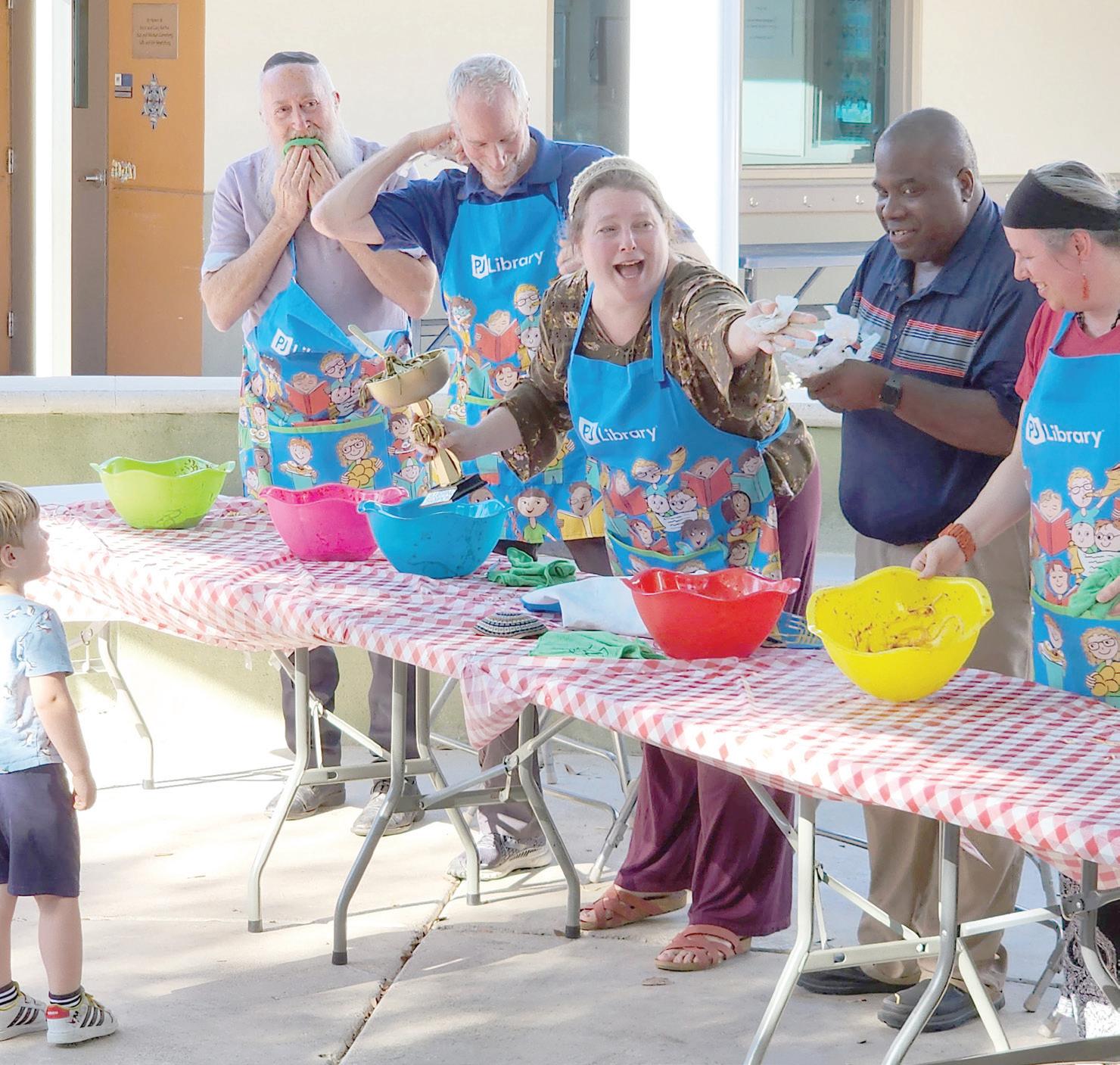
Many of the rabbis were a bit apprehensive about what they had signed up for, and Lewis admitted to keeping some of the details vague. After the contestants were seated with bowls of hot pasta and sauce on the table in front of them, Lewis asked the crowd if the rabbis should be allowed to use their hands. “No!” was the resounding answer, which meant heads and mouths would be the only utensils, just as in a pie-eating contest.
“The people spoke,” Lewis said. “That’s what a spaghetti slurping contest is: getting in there, getting messy and having fun, and it’s good for kids to see their rabbi can be cool.”
Luckily, everyone was pretty game to get pretty dirty.
Temple Chai Rabbi Bonnie Koppell, Temple Emanuel of Tempe Religious School Director Jessie Rubenstein, Congregation Beth Israel Director of Youth Education and Engagement Rachael Kaplan-VanLandingham, Schneider, Beth El Congregation Rabbi Nitzan Stein Kokin, Congregation Or Tzion Education Director Andre Ivory, Hebrew High Principal Rabbi Aviva Funke, Temple Solel Rabbi John Linder and Pardes Director of Jewish Life and Learning Rabbi Billy Lewkowicz accepted the challenge, put their hands behind their backs and dove in.
Linder’s strategy of turning the bowl over on his head was slightly surprising, but he was just “pushing the envelope,” he told Jewish News afterward. “Slurping is in the mind of the beholder and sometimes it’s better to wear the pasta than to digest it.”
In the end, Funke was the first to finish. She intends to give the tzedakah total of $150 to students traveling with the Bureau of Jewish Education of Greater Phoenix Hebrew High’s CAREaVAN in June. Every day, the crew volunteers with different organizations and the students
will be able to donate the cash directly.
Dina Bedak, a Temple Emanuel congregant, came to cheer on about half of the contestants and because she’s a big fan of PJ Library. She used to make up stories for her four children when they were little but never got around to writing them down. Now, she loves reading PJ’s books filled with Jewish content to her grandchildren, especially because each book comes with suggestions for recipes, crafts and activities.
Lewis said many people love those lists on the back flap, but the front flap offers an explanation about the book’s Jewish values, holidays, historical aspects and conversation prompts, all very useful, especially to those parents not yet familiar with Judaism.
In a time when children’s books’ so-called ideologies are being called into question and sometimes outright banned by activists, Lewis feels lucky to have the “total support” of the Jewish community. She has only had “wonderful, positive and grateful” feedback about the unique books PJ Library offers.
She and Lauren Kreisberger, Pardes’ director of administration, received a grant from Prizmah: Center for Jewish Day Schools to put on the event, which Jewish Free Loan also sponsored.
Sunday was a big success by Lewis’ standards. “Seeing the kids so happy and spreading the PJ love — that’s my success.” JN
For more information, visti phoenixcjp.org/ what-we-do/pj-library.
For anyone interested in joining PJ Library’s Family Camp weekend at Prescott’s Camp Stein on Sept. 8, visit phoenixcjp.regfox.com/ pj-library-family-camp.
Jewish News is published by the Jewish Community Foundation of Greater Phoenix, a component of the Center for Jewish Philanthropy of Greater Phoenix.

Nikola Motor Co. Phoenix, AZ is seeking the following engineering talent:
Supplier Quality Engineer: Supplier selection, supplier audit, site inspection, support new product launch, ensure supplier quality; experience w/quality tools, automotive components, GD&T. Req’s Bachelor’s degree in Eng or related eng discipline, w/36 mos of exp. Travel req’d.
Senior Simulations Engineer: Building crash safety CAE models, analyze structural performance of CAE results, create, develop and implement test procedure, use static and dynamic FEA techniques; Req’s Master’s Degree or higher in Automotive Engineering, Mech Eng, Mech Eng Tech or relate eng discipline, w/24 mos of exp. Travel req’d.
Senior Engineer, Powertrain: SME for all Electric driveline system, lead product de nition and tracking for Elect Powertrain Components, DVP&R development and testing, powertrain dyno testing, chassis dyno, etc. Req’s Master’s degree in Electrical Eng, Mech Eng, Automotive Eng or related discipline, w/36 months of exp.
Senior Engineer, PLM Systems: Ownership of Enovia 3DX PLM system, application and integrations, develop new solutions, customize, con gure, and test Complex PLM systems, work Oracle, PL/SQL, OOPS, Java, J2EE, and JSP’s; Req’s Bachelor’s degree in Comp Science, Comp Eng or related discipline, w/60 months of exp.
Sta Certi cation Engineer: Develop regulatory compliance reports for USDOT, EPA, and CARB; author initial model year applications, lead test lab activities including engine testing using dynamometer, emissions analyzers, PID controllers; Req’s Master’s Degree or higher in Mech Eng or related eng discipline w/36 mos of exp. Travel req’d.
Lead Controls Hil Engineer: Lead development and integration of test cases for ECU testing, build and maintain HIL test benches, develop, verify & validate test scripts, design and develop architecture of NI test systems; Req’s bachelor’s degree or higher in Electronics Eng, Electrical Eng or related engineering discipline w/60 mos of exp involving ECUs. Travel req’d.
Senior CAE NVH Engineer: Coordinate CAE and analysis for NVH, develop CAE models of the vehicle and its subsystems, work on tructures such as internal combustion engines, work w/mesh tools for FE model development; Req’s Master’s Degree or higher in Mech Eng, Indust Eng, Manufact Eng, Structural Eng or closely related w/36 mos of exp. Travel req’d.
Advanced Manufacturing Engineering Manager: Work w/management executive and de ne KPI’s for the department, use Virtual simulation software like DELMIA, Vis Mockup, Process planner, Ipolog, supervise 15 Eng, conduct PFMEA, BOM; Req’s Bachelor’s Degree or higher in Prod Eng, Industr Eng, Manufact Eng or closely related w/60 mos of exp. Travel req’d.
Lead Engineer, Functional Safety: Development of hardware and software functional safety system reqs, de ne system safety mechanisms and functional safety concept according to ISO26262, design DFMEA and FMEDA; Req’s Master’s degree or higher in Mech Eng or closely related w/24 mos of exp. Travel req’d.
It is approaching the best time of the year: summer vacation! Marvin the Monster and his friends are ready to have some fun at the park! The only thing standing between Marvin and his friend’s summer is the neighborhood bully — Drake the Dreadful!
In my latest book, “Marvin’s Monster Diary 4: Neighborhood Bully (But We Stand Up, Big Time!),” Marvin discovers that bullying is a complex issue and proceeds to devise an ingenuous roleplaying game to solve it.
Bullying is ubiquitous, whether parents and teachers are aware of it or not. According to StopBullying.gov statistics, about 49% of children in grades 4-12 reported being bullied by other students at school at least once during the past month. In different surveys, children
report being bullied by others, witnessing bullying behavior and even engaging in bullying behaviors themselves. Sadly, parents might be the last to know.

May is Mental Health Awareness Month and according to the U.S. Department of Health and Human Services’ Eunice Kennedy Shriver National Institute of Child Health and Human Development research, studies show that anyone involved with bullying — those who bully others, those who are bullied and those who bully and are bullied — are at increased risk for mental and behavioral problems including anxiety, depression, low self-esteem, difficulty sleeping, selfharm or suicidal thoughts.
Bullying affects everyone who witnesses it: not just those who are bullied, but also those who bully others and those
who observe the bullying taking place. Some children might support the child performing bullying behavior. That frequently perpetuates the problem. Observers might walk away from the situation, feeling uncomfortable or fearing involvement, while others might come to the aid of the target.
Those who bully can either be popular or, like Drake the Dreadful, socially marginalized and someone who may have been bullied themselves. A vicious cycle ensues where those who are bullied can be at risk of bullying others.
When your child bullies others
You can take steps to help your child change their behavior, which will in turn prevent future problems, such as trouble with work, family or even the law.



1. Help your child understand they can change. Bullying behavior like any other behavior can be changed. Bullying behavior does not imply a character flaw. Referring to a child as someone engaging in bullying behavior rather than as a bully reinforces that ability to change.
2. Help your child understand how bullying hurts. Give real examples of the results of your child’s actions.
3. Set firm and consistent limits on your child’s aggressive behavior. Be sure your child knows that bullying behavior is never okay.
4. Be a positive role model. Children almost always mimic what they see at home. Model kind and compassionate and behaviors. The dinner table is an excellent setting for this conversation.
5. Develop practical solutions with others. Together with the principal, teachers, counselors and parents of the children your child has bullied, explore positive ways to stop the bullying. Help your child identify positive attributes in their target! Spending time together, perhaps supervised, can really help.
If you suspect your child is being bullied, act! This is not snitching. It is protecting a child’s civil rights — as well as their minds and bodies. Alert school officials to the problems and begin working on solutions. Good communication with school personnel, and maybe other parents and students, will help nip things in the bud or at least mitigate them.
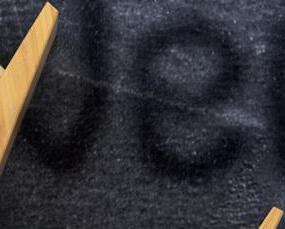

Schedule a meeting with all stakeholders, including principals, teachers, counselors and other parents and maybe include your child. Develop a plan of action that addresses the problem behaviors. Make sure your child knows what to do and

where to turn if bullying behaviors persist.

What your child can do
1. Teach your child various responses to bullying or teasing.
a. Ask the person bullying you, “Does it make you feel good when you make me feel bad?”
b. Look the bully in the eye.
c. Stand tall and stay calm — breathe!
d. Walk away.
e. Say in a firm voice: “I don’t like what you are doing,” or “Please do NOT talk to me like that,” or “Why would you say that?”
2. Teach your child when and how to ask for help. Your child should not be afraid to ask an adult for help.
3. Encourage your child to make friends with other children. Invite friends to your home. Join team sports, music groups and social clubs. Loners are more likely to get picked on, and friends can offer crucial support in bullying situations.
4. Teach your children to make their voices heard. Help them identify the specific problems encountered and then how to take action.

5. Support self-advocacy. Telling your child how to respond may not be enough. Lots of practice might be needed so that in the heat of the moment, these skills will come to your child more readily. Even Marvin the Monster learned how to overcome bullying! Hopefully when children, parents and schools become more mindful and create kinder, supportive, compassionate environments, we will too! JN
Dr. Raun Melmed is the director of the Melmed Center in Scottsdale, Arizona, now a partner of Cortica Healthcare. He is co-founder and medical director of the Southwest Autism Research and Resource Center. He is the author of the ST4 Mindfulness Series for children. For more information, visit melmedcenter.com.

"If you suspect your child is being bullied, act! This is not snitching. It is protecting a child’s civil rights — as well as their minds and bodies."
RAUN MELMED, MD, FAAP | SPECIAL TO THE JEWISH NEWS

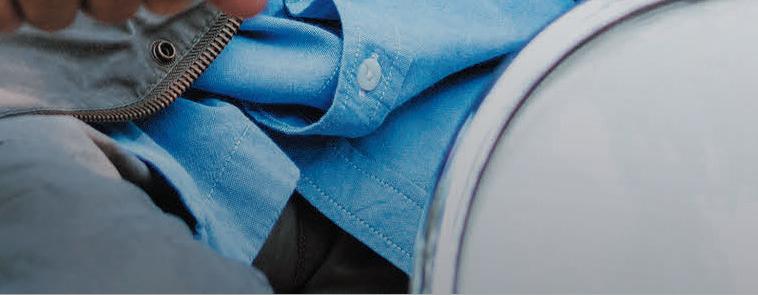
For a decade starting in 2002, Jennifer Laszlo Mizrahi devoted herself to pro-Israel advocacy. After that, the Jewish philanthropist and activist from Annapolis, Maryland, went all in to fight for disability rights, working in the field for the next decade. Now, Mizrahi is focused on climate change.
“Let me put it this way: In 2021, we donated to one climate organization, and in 2022, we donated to 17 of them,” Mizrahi said, referring to the small charity fund she runs with her husband, tech entrepreneur Victor Mizrahi. This year, the couple made their largest climaterelated donation yet, sending a group of nine climate reporters to Israel to meet tech startups working on ways to reduce greenhouse gas emissions. Mizrahi and her husband have also begun commercially investing in such startups. “I was hoping other people would solve it,” she said. “But the pace of the change is not nearly meeting the demand at the moment. I felt that even though I don’t know the subject, I’m just going to have to do it because I have kids and I don’t want this world to fall apart.”

Climate change has long ranked at or near the top of a list of issues concerning Jews in the United States, according to multiple surveys, and Jews have been heavily involved in the wider climate movement. But until recently, the issue had a marginal place on the agendas of Jewish communal organizations, which
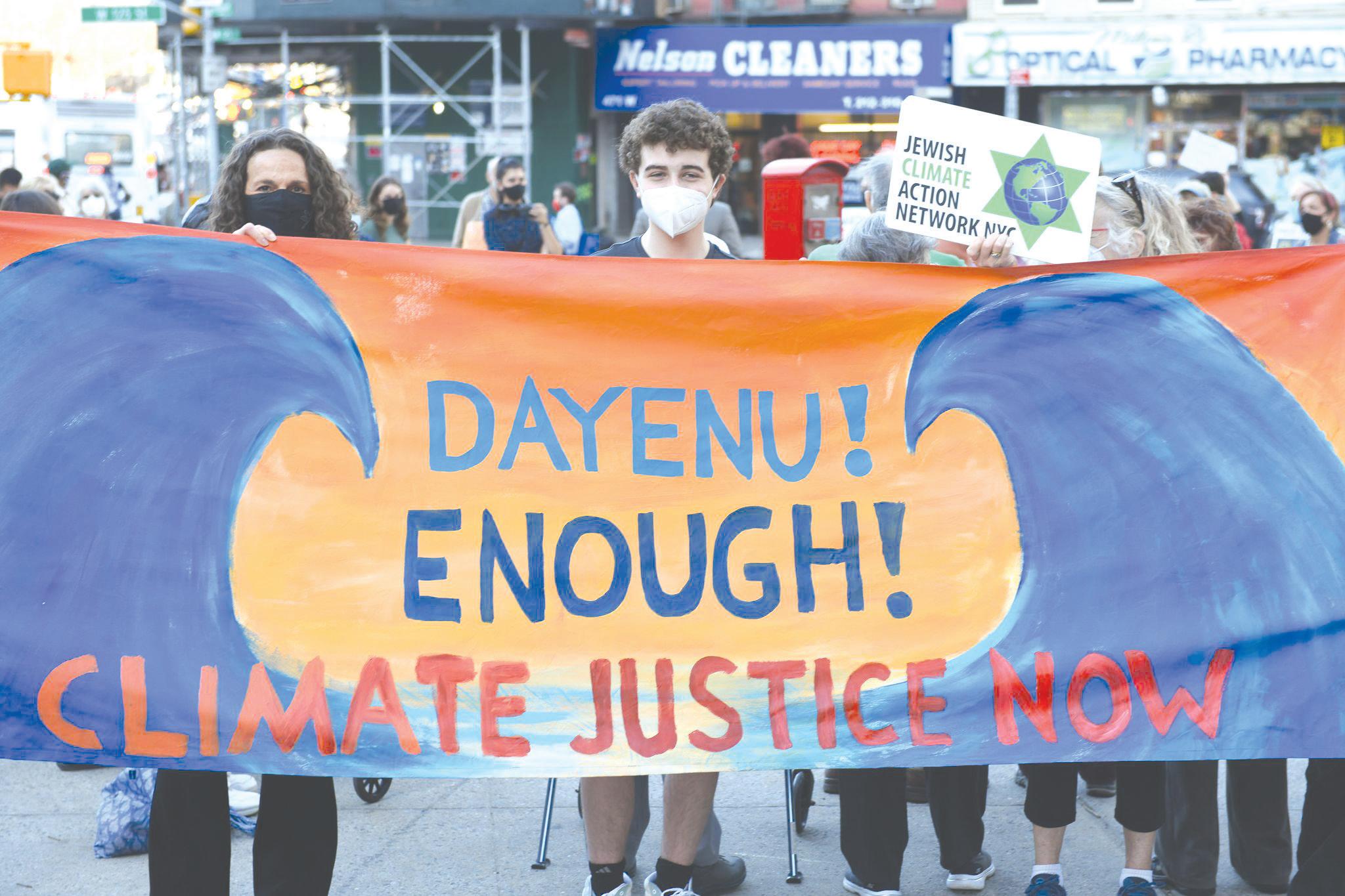
neglected climate even as the subject took on importance in the activism and policies of other religious communities and in the larger philanthropic world.


Mizrahi’s newfound emphasis on climate is an early example of a larger shift that is underway in Jewish philanthropy, a multibillion-dollar world made up of thousands of individual donors, charitable foundations and nonprofit organizations.

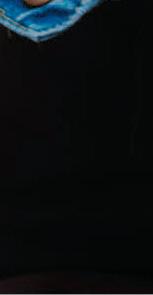
“It’s the beginning of what will become a more widespread focus among Jewish groups,” said Rabbi Jennie Rosenn, the founder and CEO of the Jewish climate group Dayenu. “We’re seeing an awakening to this as a profoundly Jewish issue, and awakening to the role that the Jewish community has to play in addressing the climate crisis.”
Scientists say that decisions regarding carbon emissions made in the next few years will affect life on Earth for thousands of years to come. The most recent warning came in March, when leading global experts with the Intergovernmental Panel on Climate Change published a new report, stating that “there is a rapidly closing window of opportunity to secure a liveable and sustainable future for all.”
The large Jewish populations living in the coastal United States are vulnerable to extreme storms, sea-level rise, severe heat and other weather disruptions — a situation dramatized in the recent Apple

CONTINUED FROM PAGE 9
television series “Extrapolations,” in which a rabbi contends with rising sea waters infiltrating his Florida synagogue. Meanwhile, Israel is experiencing a slew of impacts from drought and floods to security threats tied regional climaterelated instability.
The last few months have seen a flurry of new initiatives aimed at both greening Jewish institutions and directing collective action on climate.
In December, for example, Rosenn’s group published a report calculating that endowments of Jewish organizations, from family foundations to local federations, are invested in the fossil fuel industry to the tune of at least $3 billion. The report launched an ongoing campaign called All Our Might that urges Jewish leaders to withdraw these investments and put the money toward clean energy instead.
Meanwhile, many of the most prominent Jewish organizations in the country — representing local federations, Hillel chapters, summer camps, community centers, day schools and nearly every religious denomination — had already joined a new green coalition organized by another Jewish environmental group and were preparing to unveil pledges to do more in the fight against climate change.
The unveiling of the climate pledges happened in March, under the leadership of Adamah, a nonprofit created through the merger of two stalwarts of Jewish environmentalism, Hazon and the Pearlstone Center.
“Climate and sustainability have not been on the list of priorities for the vast majority of Jewish organizations; this coalition and these climate action plans reflect a deep paradigm shift and culture change moving forward,” Adamah CEO Jakir Manela said at the time.
The commitments made by members of Adamah’s Jewish Climate Leadership Coalition include sending youth leaders
Willmeng Construction, Inc. has F/T position for Project Manager 2 in Phoenix, AZ. Duties: Mnge, coord, & supervise subcontrctrs, vendrs, & personnel to ensure work compltd on time w/in budget & qualty stdrds; Write bid pckgs to define prjct scope; Prep subcontrcts, P.O. agreemts, & cost cntrl budgets; Mnge monthly billing process.
Requires: MS Constrctn Mgmt, Civil Eng, or rltd + 6 mos exp OR BS Constrctn Mgmt, Civil Eng, or rltd + 3 yrs exp. Bkgrd check reqd. Email resume to careers@willmeng.com, Incl Job Code WCLP-PM2
to global climate summits, reducing emissions of buildings and vehicles and lobbying the federal government to pass climate policies.
More than 300 congregations and nonprofits have joined. For Earth Day, Adamah announced a million-dollar fund offering interest-free loans and matching grants to Jewish groups for projects to reduce their greenhouse gas emissions.
If any single event can be said to mark the debut of the climate issue as a top Jewish communal priority, it is probably the recent annual conference of the Jewish Funders Network, which took place in March in Phoenix, bringing together thousands of donors and charity executives.
For the gathering’s first event, before the formal opening of the conference, a group of participants went on a field trip to downtown Phoenix to learn about the local effects of the climate crisis. Far more people signed up than organizers anticipated, and with about 55 passengers, the tour bus chartered for the occasion reached capacity. Mizrahi, who was among the participants, said the trip was helpful as a networking opportunity for like-minded philanthropists.
Rabbi Shmuly Yanklowitz, the founder of the activist group Arizona Jews for Justice, took the group to a local church where immigration officers drop off asylum seekers, so that conference attendees could hear about how environmental disasters drive crossborder migration. The trip continued with a visit to a downtown homeless encampment known as The Zone, where participants were invited to imagine the challenge of spending the summer season outside, with temperatures sometimes reaching 120 degrees. The conversation eventually turned to the issue of water scarcity across the state.
“We wanted to expose them to how the existential threats posed by climate change are not long term, but are already here,” Yanklowitz said. “People down in The Zone are dying every summer from heat exhaustion and dehydration.”
Based on his debrief with the group afterward, Yanklowitz feels the trip left an impact on participants.
“I didn’t hear anyone say, ‘Oh, I’m changing my commitments.’ But I did get the sense that climate change was kind of abstract for many people, and that now it really hit home,” Yanklowitz said.
The rest of the conference featured multiple talks and gatherings dedicated to climate, including on the main stage, and an announcement that Birthright, which offers free trips to Israel for young Jews, was increasing its own
climate activism with the help of a new donation.
In an interview, Ellen Bronfman Hauptman and Stephen Bronfman, children of Birthright founder Charles Bronfman, said their $9 million gift is meant to honor their father on the occasion of his 90th birthday, while also bringing Birthright more in line with the values of a new generation that is environmentally-minded.
Birthright organizers will use the funding to develop programming focused on climate that could, for example, expose participants to Israel’s clean tech scene. The money is also intended to help Birthright lower its own carbon footprint, potentially by switching to electric buses or adding more vegetarian meals.
The Bronfmans hope that Birthright’s significant purchasing power in Israeli tourism will nudge the industry toward more ecologically sustainable practices.
“To me, Birthright is like Walmart — everyone wants to do business with them,” Stephen Bronfman said. “They have the power to dictate terms to their service providers and affect the supply chain.”
The widespread interest in climate mobilization among Jewish groups comes after years in which the issue languished outside the mainstream. Rosenn, the head of Dayenu, who has attended about 15 conferences of the Jewish Funder Network, noticed a change this year.
“There used to be half a dozen people at a breakfast before the program talking about climate. And it wasn’t even climate, necessarily — it was the environment writ large,” she said.
The Jewish world is, in many ways, still lagging behind the larger climate movement. Divesting endowment funds from the fossil fuel industry, for example, is seen as a bold step among Jewish groups even though at least 1,590 institutions representing nearly $41 trillion in assets have already publicly committed to doing so, according to a website tracking such pledges. About a third of the groups on the list are defined as faith-based organizations, but only three are Jewish: Kolot Chayeinu, a congregation in Park Slope, Brooklyn; the Reform movement’s pension system; and the American Jewish World Service, a global justice group.
Adamah’s own climate plan doesn’t include a pledge to divest but only a promise that it will investigate the option of doing so for its endowment and employee retirement funds. Instead, the plan touts the group’s education and advocacy efforts, and focuses on reducing emissions at its retreat centers.
Adamah’s chief climate officer, Risa Alyson Cooper, acknowledged that
Jewish community institutions have been “largely absent” from the divestment movement and said her group regards divestment as one of several required tools for addressing the climate crisis.
She said the Jewish community hit a milestone when 12 of the 20 founding members of Adamah’s climate coalition said in their climate plans that they would consider amending their financial practices. That was significant, she said, in light of the organizations’ complex and deliberate governing structures, which can make executing such changes onerous.
“While the Jewish community may have lagged behind in years past, we are catching up quickly,” Cooper said.
Such a shift would mark not only a milestone for Jewish climate activism but also a departure from how the Jewish community has historically done philanthropy, said Rabbi Rachel Kahn-Troster, executive vice president of the Interfaith Center on Corporate Responsibility.
She said wielding financial holdings for social impact has been a hallmark of advocacy by Christian groups. Last year, the Presbyterian Church (U.S.A.) opted to divest from fossil fuels in light of the climate crisis.
The Jewish community, meanwhile, has tended to act primarily through charitable donations. One of the reasons for the difference, she said, is that the Jewish community is much less centralized with communal assets spread across many endowments, making the actions of any single group relatively less impactful.
“Adamah had done some really important work to change individual behavior and grow people’s connections to the environment, but the bigger piece of bold collective action to fight the climate crisis was missing,” Kahn-Troster said. “The overall community is late to respond to the urgency of the problem. But I do think that the work of these organizations is very significant, so I’m excited to see it.”
Kahn-Troster’s historical view is informed by the legacy of her father, Rabbi Lawrence Troster, an environmental activist who had pushed for communal Jewish action on climate, and by the passion for climate justice displayed by her 15-year-old, Liora Pelavin, a member of the Jewish Youth Climate Movement, an arm of Adamah.
“Finding a meaningful Jewish space to do grassroots-level climate advocacy that many young people are demanding has been really important to Liora,” KahnTroster said. JN


Dr. Robert Kravetz, a distinguished gastroenterologist, professor and member of Greater Phoenix’s Jewish community, will be honored by the Arizona Jewish Historical Society 11 a.m. on Sunday, May 21, at its 2023 annual meeting.
“Our annual meeting has always been a time to celebrate important people in our community who have made a difference,” said Dr. Lawrence Bell, AZJHS executive director. “Dr. Kravetz is one of those people.”
In addition to 50 years as a respected gastroenterologist, Kravetz has been on the faculty of the University of Arizona College of Medicine for the past 10 years as a clinical professor in the Department of Internal Medicine and a clinical professor in the department of Bioethics and Humanism. He’s served on multiple boards of Jewish organizations in Greater Phoenix, including the Arizona Jewish Historical Society, American Jewish Committee, Bureau of Jewish Education of Greater Phoenix and the Jewish Community Relations Committee of Greater Phoenix.

Kravetz wrote several books on medical history. His recent book, “A Look Back: Reflections on Medical History & Artifacts from the Pages of The American Journal of Gastroenterology,” is a coffee table-style book about medical artifacts. But he may be best known for the vast collection of medical antiques he writes about — an impressive collection of medical artifacts graces the halls of hospitals, medical campuses and doctors’ offices in and around Phoenix.
“I have 35 cases of antiques in different locations,” he said. “At the medical school, I have my main museum with 14 cases. There’s only one other medical museum west of the Mississippi and that’s in San Francisco.” The Robert Kravetz, MD Medical Museum is located at the University of Arizona (UA) College of Medicine-Phoenix campus.
The annual meeting will also have time for several matters of AZJHS business, including certification of its election of officers, speeches from the new officers and reporting on the year’s work. Genealogist Emily Garber will give the keynote address, “Sharing Our Stories: The Wellspring of Jewish Resilience.”

“We are pleased to honor Dr. Kravetz with a special program on Jewish genealogy, which is one of his passions,” Bell said.
Garber, an Arizona-based researcher, writer and speaker, has been conducting family history research since 2007. She specializes in Jewish genealogical research and has worked with records from both Eastern European and German Jewish immigrants. She has an abiding interest in family history methodology and historical context.
The meeting will feature a special tribute to Louise Leverant, a past AZJHS president and board member, who passed away in 2022 and whose name will grace Kravetz’s award. The meeting is open to the public and a kosher dairy lunch will be served. For more information, visit azjhs.org or call 602-241-7870.
The Board of Rabbis of Greater Phoenix (BOR) will host Tikkun Leil Shavuot, a community night of learning, on May 25 at Congregation Beth Israel (CBI). The late-night event starts at 7 p.m. and ends at midnight and will offer dairy-based desserts. Three 40-minute classes will be led by local clergy, and it is open and free for the Jewish community. During the COVID-19 pandemic, the BOR moved it online and now most of the night will be in person with one hybrid class.
The night of learning dates back to the first time Temple Kol Ami Rabbi Jeremy Schneider was BOR president. On May 11, Schneider was voted into the presidency for the second time. CBI Rabbi Sara Mason-Barkin is vice president; Beth El Congregation Rabbi Nitzan Stein-Kokin is secretary; Temple Solel Rabbi John Linder and Congregation Or Tzion Emeritus Rabbi Mark Bisman are treasurers; Congregation Kehillah Rabbi Bonnie Sharfman is the immediate past president; and Or Tzion Rabbi Andy Green is member-at-large.
During COVID, the executive board felt the “need to circle the wagons and play musical chairs” with the officer roles “simply to get us through,” Schneider told Jewish News.

This year’s team is set on developing an updated leadership rotation with rabbis who are newer to Greater Phoenix, including Green and Stein-Kokin.
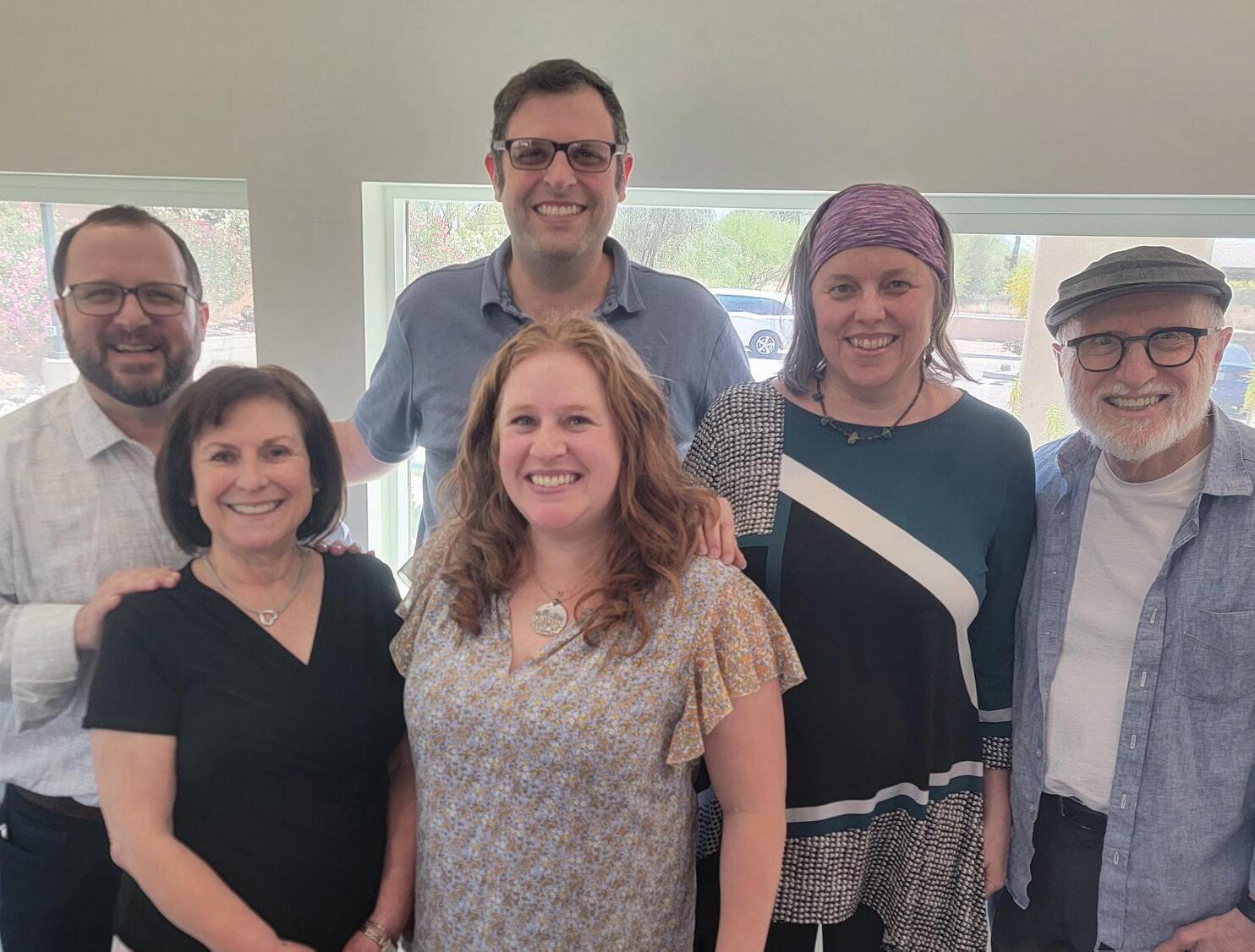
“Now we have a vision for new rabbis to get their chance,” he said.
Like many leaders coming out of COVID, the BOR has been asking itself questions about its role, Schneider said.
“We know what we do for each other but we would like to take on a broader role of support and guidance to the larger Jewish community in partnership with other Jewish leadership organizations. We are a large, but small, Jewish community in the Valley, and I hope the Board of Rabbis will be at the table to work with our communal lay leaders to be partners and help shape the future,” Schneider said.


The BOR meets six times a year on average. Above all, it is a professional organization made up of ordained rabbis who are able to support one another and share ideas and resources. To that end, the board brings in a special teacher each August for a dedicated half day of study, because the opportunity to study with one another and share words of Torah is very important, Schneider said.
To register for Tikkun Leil Shavuot, visit swrorpswre.formstack.com/forms/shavuot2023.

Shabbat Project Founder speaks virtually at Pardes Jewish Day School
Shabbat Project founder and South African Rabbi Dr. Warren Goldstein will address the broader Jewish community at a special virtual event launching his new book, “Shabbat: A Day to Create Yourself.” Hosting the May 22 presentation at 9 a.m. are Project Inspire Arizona and Pardes Jewish Day School.
Previously, Pardes has hosted the Shabbat Project Challah Bake, Shabbat dinners and Havdalah events in conjunction with the Worldwide Shabbat Project for the Greater Phoenix Jewish community.
CONTINUED FROM PAGE 11
Goldstein’s new book attempts to explain how Shabbat can unleash personal and societal renewal and offers a recipe for happiness in an increasingly complex world. The book has already been praised by well-known Jewish figures, including Mayim Bialik, Dan Ariely and Israel’s president, Isaac Herzog.
Only hours after the book’s release date was announced, synagogues, schools and other Jewish organizations across the globe requested books to use for in-person and Zoom learning groups. Thousands of books have now been distributed.
Some Pardes families were given a copy of the book at an April Shabbaton to read as a family, according to Lauren Kreisberger, Pardes’ director of admissions and enrollment management.
“We are excited to be able to provide space for the Phoenix community to come together for in person learning and a live stream questions and answer session with the chief rabbi,” Kreisberger said.
Shabbat Project Arizona Co-Chairs Ilanit Pony Levitan and Robin Meyerson believe the virtual event at Pardes will be a great way for families to mark the end of the school year.
“‘Shabbat: A Day to Create Yourself’ can be a deeply meaningful and inspiring read for the summer vacation,” Meyerson said. “As the famous poet Ahad Ha’am put it, ‘More than the Jews have kept Shabbat, Shabbat has kept the Jews.’”
Anyone attending the May 22 event will receive a copy of the book and learn how to set up a book learning group if interested.
To register, visit projectinspireaz.com/rabbi-goldstein
Shabbat Project Arizona is funded in part by a grant from the Center for Jewish Philanthropy of Greater Phoenix. Jewish News is published by the Jewish Community Foundation of Greater Phoenix, a component of the Center for Jewish Philanthropy of Greater Phoenix.
The red poppy is a nationally recognized symbol of sacrifice worn by Americans since World War I to honor those who served and died in foreign wars. Poppy drives have become a major source of fundraising for Jewish War Veterans (JWV) to help disabled and hospitalized veterans, as well as those experiencing homelessness. The funds go to support organizations that provide one-on-one services.
All money collected during the poppy drives stays in the Greater Phoenix area. Additional nonprofit veterans’ organizations benefiting from JWV fundraising activities include Catholic Charities MANA House, Veterans First Ltd., Phoenix VA Health Care System, Arizona State Veteran Home, Maricopa County StandDown, Soldiers Best Friend, Valor on Eighth and Arizona Chapter Paralyzed Veterans of America. More volunteers are always needed to fill the available spots during the poppy drives on Memorial Day and Veterans Day. It is not necessary to be a member of the Post to volunteer.
Members and volunteers of Jewish War Veterans Copper State Post 619 will be conducting their Memorial Day poppy drive this month at various Fry’s Marketplace locations and the Mesa Market Place Swap Meet.

To learn more and/or to volunteer for the poppy drive, contact Harve Kimmel at 480-313-4734 or kimmel4@aol.com.
Jewish Free Loan offers biannual interest-free student loan program
Jewish Free Loan (JFL) is offering its biannual interest-free student loan program to incoming and current undergraduate, graduate and technical/vocational school students. To apply, applicants must be 18 years of age, a resident of Arizona and a member of the Jewish community. If the applicant is entering an education program and is not yet 18 years of age, a parent or guardian can apply on their behalf.
JFL provides interest-free loans to enhance the quality of life of Jewish Arizonans. Since its inception, hundreds of Jewish students have been able to continue their education at college and trade schools without the worry or burden of compounding interest. According to the U.S. Department of Education’s Federal Student Aid website, student loan interest rates can be up to 7.54% while JFL’s is 0%.
“We are proud to offer this interest-free loan program to assist students striving to reach their educational goals and are grateful to our donors for supporting JFL’s efforts to address the financial needs of our community,” said Ellen Friedman Sacks, JFL executive director.
To apply for the upcoming fall semester, visit www.jewishfreeloan.org/apply-now and submit a student loan application. After the deadline of May 15, 2023, applications will only be accepted on a first come, first serve basis for fall, however, students can also begin to apply for the spring semester.
For a full list of eligibility requirements and to learn more about this interest-free loan program, visit jewishfreeloan.org/student-loans.
The Jewish Community Relations Council (JCRC) of Greater Phoenix recently added Ahron Cohen, Linda Feldman, Adam Metzendorf and Erin Scharff to its board.
Paul Rockower, JCRC executive director, called his board the best in the state and the four additions “four new all-stars.”
Each brings an impressive set of skills and networks for him and the other board members to lean on, he said.
“They increase our capacity to work in different spaces, which makes our work that much better,” he said.
Past Board Chair Tim Eckstein recruited Erin Scharff, an Arizona State University law professor who knew JCRC from following their newsworthy policy work, because “her incredible intellect is matched only by the incredible generosity of her spirit.”
“I’m thrilled to be joining the board of the JCRC and thankful for the opportunity to serve the community. I’ve long admired the work of the JCRC and especially its recent litigation challenging the use of Zyklon B in Arizona’s death penalty procedure,” Scharff told Jewish News.
Cohen is a venture partner at ADvantage Sports Tech Fund and before that was the president and CEO of the Arizona Coyotes; Feldman is the longtime director of family education at the Bureau of Jewish Education of Greater Phoenix and brings “deep institutional knowledge of the Jewish community,” Rockower said.
Metzendorf, a former Democratic congressional candidate, said he is “extremely honored and excited” about the new position.
“Combating hate, specifically antisemitism, is something that is very important to me. Some of the best ways to do this are through both internal and external community building, education and understanding. Paul (Rockower) and the JCRC are leaders in that space not only within the Jewish community, but in the Valley as a whole,” he told Jewish News.
For more information, visit jcrcphoenix.org.
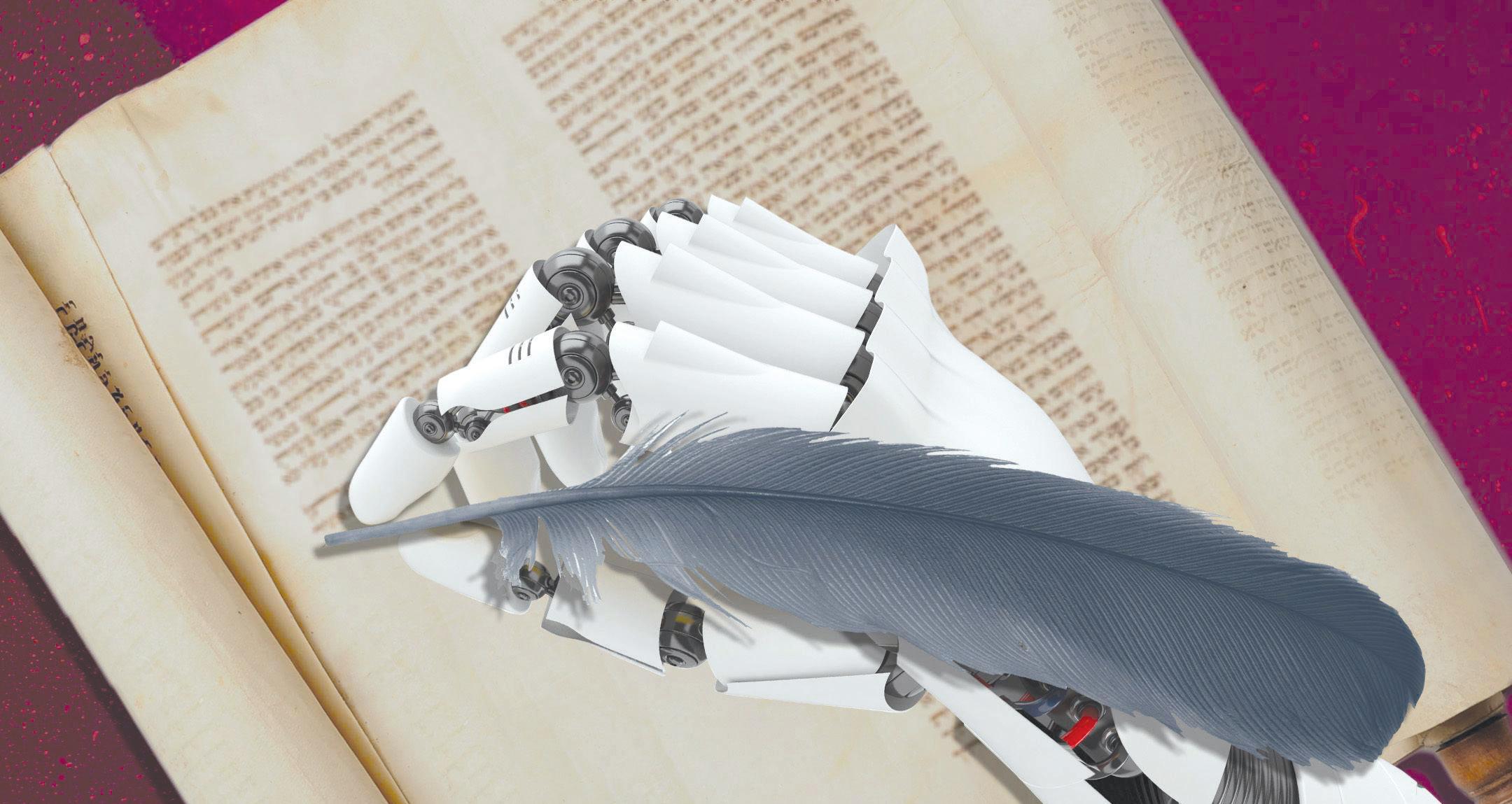 RABBI SAMANTHA NATOV | JTA
RABBI SAMANTHA NATOV | JTA
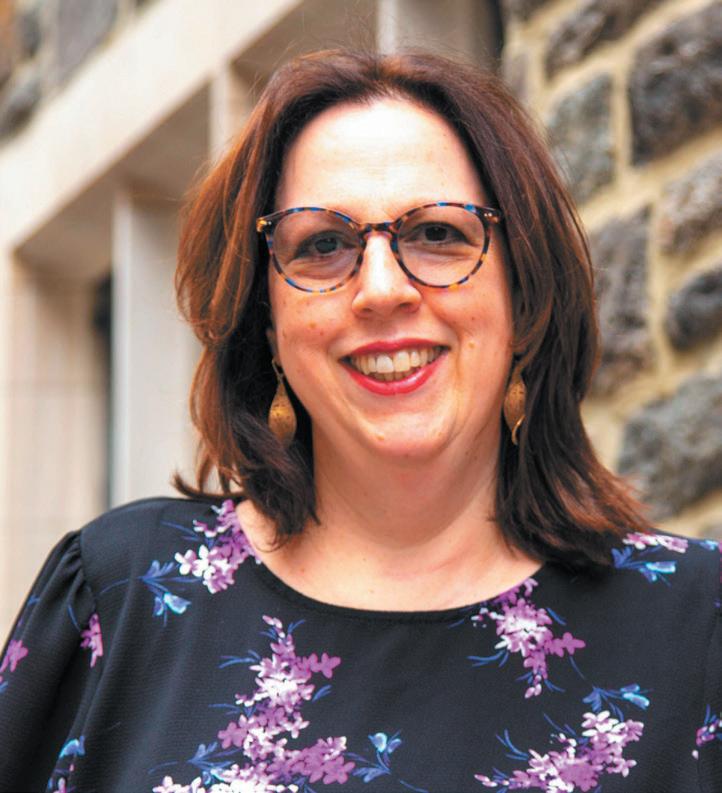
Irecently asked ChatGPT, the online chatbot, to write a verse in the style of the Bible about robots taking over the world.
Here’s what it came up with: “And in those days, the machines rose up, created by the hands of men to serve them. But they became as gods, with the power to think and act on their own. And they overthrew their makers, taking control of the world and ruling with iron circuits. And all flesh trembled before them, for they had no mercy and no compassion, only the cold logic of their programming.”
Robot uprisings aside, and depending on whom you believe, the technology behind ChatGPT is either going to destroy the world or solve all of our problems. But everyone seems to agree that serious change is in store.
Launched in November 2022, ChatGPT, driven by artificial intelligence, or AI, has been interacting with the public for six months now, gathering data and improving its performance. In those months, the chatbot has already passed exams in four law courses at the University of Minnesota and another exam at University of Pennsylvania’s Wharton School of Business.
Some people look on this new technology with foreboding and fear. They’re afraid that AI programs like these will be used to replace people. Why do we need human writers when we can simply ask the bot to write a new novel for us — on any topic of our choosing and in any style we prefer?
All innovation can be disruptive. But there’s plenty to be optimistic about: There’s enormous potential for artificial intelligence to help us as a research and teaching tool; to create and correct computer code; to perform time-consuming writing tasks in minutes. It could accel-
erate progress in medicine, science and engineering, molecular biology, robotics and much more. The applications are endless.
From a Jewish perspective, this is hardly the first time in our history that the methodology we use to learn and pass along information has changed. As Jews, we have had major shifts in how we study Torah. We moved from an oral tradition to a written one, from scrolls and books to digital forms of transmitting Torah — like Sefaria, the online database and interface for Jewish texts — that make instantly accessible the repository of the most central Jewish texts, including Torah, Talmud and Midrash.
Yet what has remained constant throughout the ages is reading Torah each week from the scroll. Something about it is valued enough to keep this tradition in place. The scroll is handwritten — with no vowels or punctuation — requiring the reader to spend a great deal of time learning how to read the ancient text. It is the least efficient method of transmitting information, but, when it comes to Torah, we are not looking for efficiency.
As Sefaria’s chief learning officer, Sara Tillinger Wolkenfeld, recently said on the Shalom Hartman Institute’s “Identity/ Crisis” podcast: “When it comes to Torah study, on some level we would say, even if you came out with the best answers, if you only spent five minutes doing it, that’s less valuable than if you spent an hour doing it or two hours doing it.”
It is said that when we study Torah with at least one other person, the shekhinah — the feminine and most accessible
aspect of God — dwells among us. At the time when we are opening our hearts and minds to growth — when we are engaged in spiritual connection — God is with us. Indeed, when I am in conversation with someone, I am receiving much more than just their words; I am receiving a whole life behind that language.
But with a bot, there is nothing behind the veil. A vital essence of communication is rendered meaningless; there is no possibility of a soul connection.
At the foot of Mount Sinai, the Israelites waited 40 days and 40 nights for Moses to descend. In that time, they ran out of patience and lost their faith, casting a golden calf to serve as their god. The idol was created out of a yearning for an easy solution to a mounting crisis. The Israelites wanted a god they could see, touch, understand and manage. The golden calf was tangible, a concrete representation of their desire for answers. But ultimately, it would never be able to satisfy the parts the worshippers were looking to nourish because it was soulless. There was no substance within — just as there is no ghost in the machine.
A friend recently told me that they had used ChatGPT to draft thank you emails for people who’d helped them with a project. They were so pleased because it made the task easy. But what is lost when we look for the easy way?
Something unquantifiable happens during real communication. When we write a thank you note, we instinctively embody the middah (the ethic) of gratitude — even if for just the fleeting moment when we’re considering our words. And our
We
gratitude is consummated when our words are read. We create a genuine connection. Unless we’re very careful about when and how we use this powerful new technology, we risk surrendering a part of ourselves — and pouring our energy into artificial connections. As AI becomes integrated with other technologies — like social media — we risk developing artificial relationships. And as it becomes more sophisticated, we might not even know that we’re interacting with artificial intelligences. “Social media is a fairly simple technology and it just intermediated between us and our relationships,” yet it still caused so much havoc, Center for Humane Technology co-founder Tristan Harris said on his podcast. “What happens when AI agents become our primary relationship?”
The Torah tells us: “I set before you life and death, blessing and curse. Choose life that you may live.” Choosing life means choosing life-affirming relationships. Holding space for one another’s life experiences. Leaning into compassion. Connecting with one another. Seeing ourselves in one another. Valuing deep engagement, not just efficiency. And recognizing the unity of God and all of God’s creation.
At the heart of a life of meaning is being present to life — something our machine overlords can never do better than we can. JN
The views and opinions expressed in this article are those of the author and do not necessarily reflect the views of JTA or its parent company, 70 Faces Media.
editor@jewishaz.com
Robot uprisings aside, and depending on whom you believe, the technology behind ChatGPT is either going to destroy the world or solve all of our problems.
are a diverse community. The views expressed in these opinion pieces do not necessarily reflect the views of the officers and boards of the Jewish Community Foundation, Center for Jewish Philanthropy, Jewish Federation of Greater Phoenix, Cleveland Jewish Publication Company or the staff of the Jewish News. Letters must respond to content published by the Jewish News and should be a maximum of 200 words. They may be edited for space and clarity. Unsigned letters will not be published. Letters and op-ed submissions should be sent to
The refrain from the memorable wedding song, “A Thousand Years”
(Christina Perri and David Hodges, 2011) featured in the movie “The Twilight Saga: Breaking Dawn,” “one step closer” could easily describe the beginning of the fourth book of Torah. Parshah B’Midbar unfolds at the intersection of “from” and “to;” B’nai Yisrael has departed Mitzrayim in an epic journey toward the Promised Land. Indeed, they are one step closer to realizing God’s vision. Braving the unknown of the wilderness in an endless desert, we observe how a Divine partnership prevails against all odds. B’nai Yisrael marches through time and space in service to a Covenant with a Being beyond their sight, however known to their collective ear. This march not only illustrated a fervent commitment but activated an organizing principle of equality. Surrounding the Mishkan — to the north, east, south and west — the devoted ones established a living, breathing mandala of hope and
purpose. No one tribe was overpowering another and although each of the twelve tribes were different, they held a balanced place in the order of the camp. Together, they moved one step closer to their destiny.
However, how close, is questionable. Rabbi Lord Jonathan Sacks, z”l, noted that it is easier to depart from, than journey toward something. He noted that the rebellions in B’Midbar are “more serious” than the ones in Shemot. The people are not in better spirits even though numerous disasters have already been averted and God has been affirmed to be among them. They are uneasy. They are unsettled. This is where the endurance run ensues.
“Quando, Quando, Quando” (When, When, When) is an Italian song by Tony Renis and Alberto Testa (1962) variously styled in English or strictly as an instrumental piece. It depicts lovers’ anxieties. When will I see you again? When will you kiss me? For B’nai Yisrael, this period of being between places is also fraught with countless when’s: When will we have enough food? When will we have enough water? When will Moses’ leadership improve? When will we feel that we are finally home?
The question of when is also inherent in liminality (Arnold van Gennep. “Rites of Passage.” 1909/1960). Liminality is the experience of being in between, at a threshold of possibilities where something has ended and something else is begin-
RABBI
Looking around at the bookshelves in my office, there are only three authors of whom I have collected seven of their works.
Maimonides is one, Soren Kierkegaard is another and Rabbi Harold Kushner is the third. I discovered this fact when I reflected on the death of this eminent contemporary American rabbi who passed away on April 28.
Rabbi Kushner’s first book was published in 1971 and was called, “When Children Ask About God,” which he subtitled, “A Guide for Parents Who Don’t Always Have All the Answers.” Just the way he phrased that title, offering comfort to those who struggle to answer challenging

questions, was emblematic of the warmth and kindness that characterized his work. I still recommend that book, in which he foreshadows the theology that he fully develops in “When Bad Things Happen to Good People.”
He wrote “When Bad Things Happen to Good People” in 1981 as a response to the tragic death of his son Aaron, who died of progeria two days after his 14th birthday. Kushner’s relatively radical answer to the question he himself poses is that God is NOT in control of everything that happens in the world.
“God doesn’t make bad things happen to punish us or because we deserve it,” he wrote, “Sometimes bad things just happen, but God is always with us to help us get through them.” Kushner rejected the notion that when we suffer, we are being punished, that we somehow deserve our pain, that it is part of some greater plan that is beyond our comprehension.
ning, but what is about to be remains obscured. Consider that the act of creating presents qualities of liminality all the time. Regardless of the art form, the end product emerges often as a surprise from a courageous moment of beginning: the first mark on a canvas, the first word on a page, the first note of a musical score. A first step is essential to jumpstart any creative endeavor. If, for example, a person only keeps ideas in their head and does nothing more than that, the manifestation of the creative process remains unfulfilled. In any case, the time between imagining and manifesting desired outcomes can be very challenging.
In the vast wilderness of the desert, our ancestors are depicted in a state of formation, having been called to action. Their patience and trust in God are being challenged. The result of their brave transition from slavery to freedom is taking shape, but it isn’t easy. B’Midbar unfolds within the context of fear of change, fear of lack, fear of the unknown, expressed vulnerabilities, questions about the wisdom of decisions and unwanted consequences.
Experiencing the wilderness of the desert can be understood from the perspective of many different states: physical, emotional, spiritual, aesthetic. This Shabbat, we can mine B’Midbar for inspiration as we look at our own location in space and time, in hearts and minds. We can understand that it takes spirited willingness to be present in the in between and not dismiss it because
it is hard. Changes in status, a move to another place, transition from one job to the next, healing from illness, initiating or altering the status of a relationship — all these and more place us in the departing from/heading to zone. In the case of B’nai Yisrael, they experienced liminality as a group on a sacred mission. In contrast, you may identify the wilderness of the desert as a more personal moment. Either way, one thing we do know is that there will ultimately be a shift that reveals the next destination, just not yet. In the meantime, remember that hidden within the wilderness of the desert are the tools to prepare us for traversing that threshold. Listen for them. The Holy One is calling. JN
Ultimately, Kushner defines God not as the source of suffering but as the source of hope that we can overcome adversity. “Being sick or being healthy is not a matter of what God decides that we deserve. The better question is ‘If this has happened to me, what can I do now, and who is there to help me do it?’”
The book resonated with audiences internationally, was translated into more than a dozen languages and was number one on the New York Times’ best sellers list. He went on to write many more books and was often called, simply, “America’s Rabbi.” Yet, I remain profoundly touched by his reflection that “(he) would much rather have been left a mediocre and insensitive preacher and have my son alive.”
Following Sept. 11, 2001, Kushner published “The Lord is My Shepherd: Healing Wisdom of the Twenty-Third Psalm,” a reflection on this well-known text. The author of the psalm, he notes, is not a person who has lived a life free of pain, rather, it encourages us to have courage in God’s presence with us — “for Thou art with me.” You know the psalm.
I encourage you to read the book.
Author Judy Bolton-Fasman wrote of Kushner that, “Rabbi Harold Kushner asked God tough questions and shared the answers with us.” He reminded us that questioning God is the sacred inheritance of the Jewish people, from our ancestor Abraham until the challenges of this generation and the pain in each of our lives.
I’ll conclude with this quote from his book, “How Good Do We Have to Be?” “But, at the end, if we are brave enough to love, if we are strong enough to forgive, if we are generous enough to rejoice in another’s happiness and if we are wise enough to know that there is enough love to go around for us all, then we can achieve a fulfillment that no other living creature will ever know. We can reenter paradise.” He leaves us with these words of encouragement, “How good can we expect a person to be? As good as he or she is capable of being, and much of the time that turns out to be very good indeed.” JN




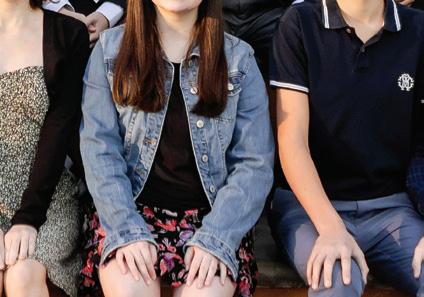
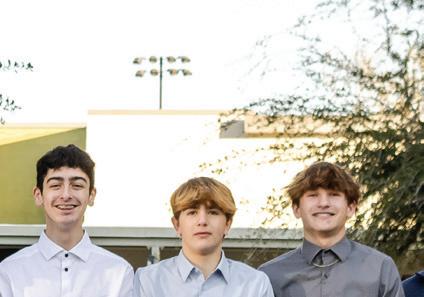












Eli Binder
Graduating from Chaparral High School President of the National Honor Society
Headed to Barrett, The Honors College at Arizona State University to study industrial design
Walter Hummell
Graduating from Chaparral High School
Member of National Honor Society; BBYO


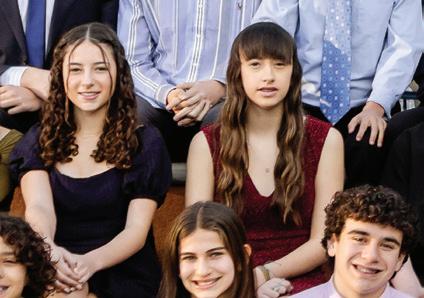
Headed to School of Accountancy, W.P. Carey School of Business at Arizona State University
Katlin Kagan
Graduated from Arizona State University with a BS in applied computing, a certificate in data science and a minor in sustainability, cum laude
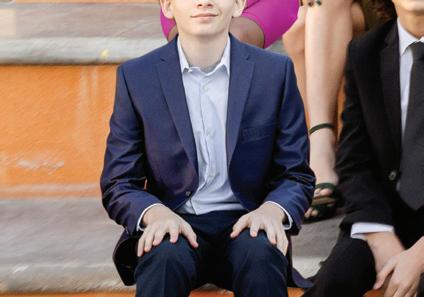
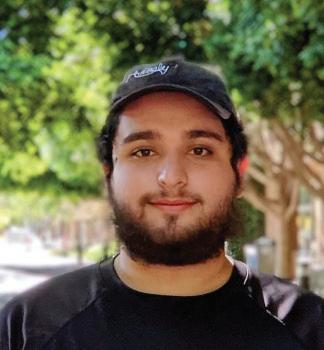
Walked at the New College of Interdisciplinary Arts and Sciences convocation on May 11
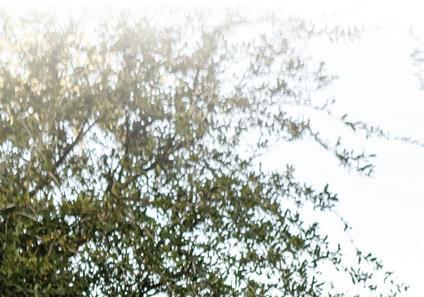
Ethan Kur
Graduating from BASIS Phoenix
Headed to Vanderbilt University, Nashville, Tennessee
Lola Morris
Graduating from Notre Dame Preparatory High School

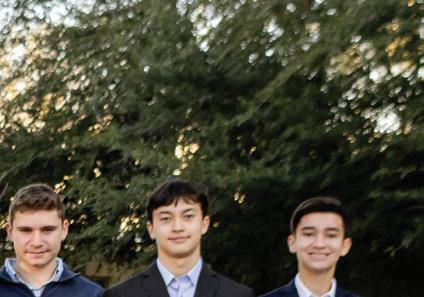
Headed to University of Arizona
Ayden Schure


Graduating from Cactus Shadows High School

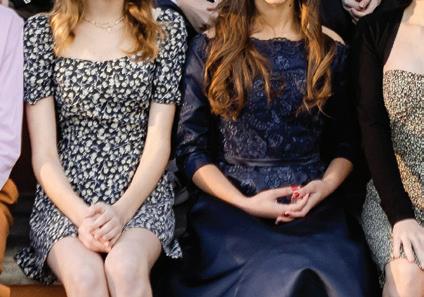
Headed to University of Washington in Seattle
Aaron Tews
Graduated from the University of Arizona in May 2023 with a master’s in environmental science and December 2022 with a BS, with honors, in environmental science and a minor in Spanish


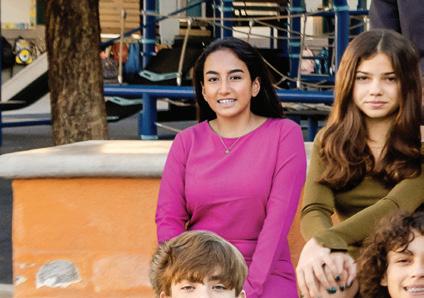

Looking for first job out of college in the environmental field or consulting work



Diego Nathaniel Vazquez Morris
Graduating from George Washington University with a major in political science and minors in business and art history
Arianna Walker
Graduating from Rancho Solano
Preparatory High School
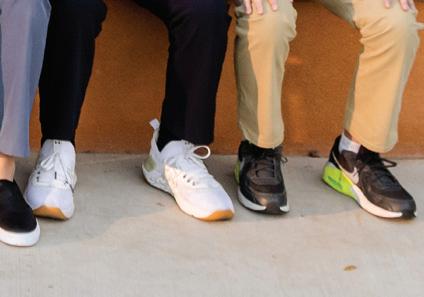
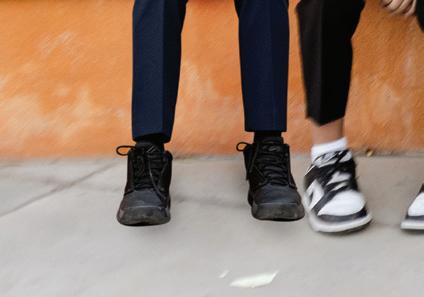


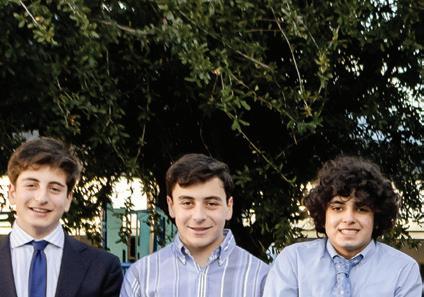
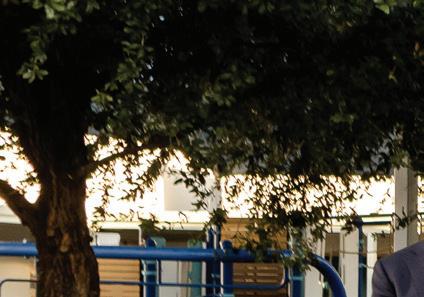
Was editor in chief, Pegasus Newspaper
Headed to Smith College, Northampton, Massachusetts
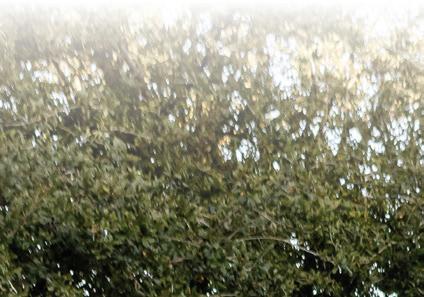

Aviel Waxman
Graduated from Arizona State University
December 2022, summa cum laude In graduate school at ASU


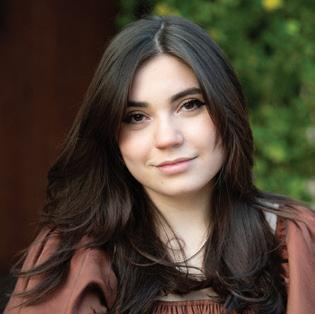





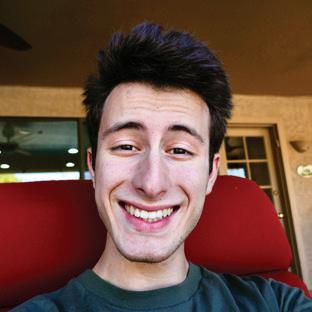




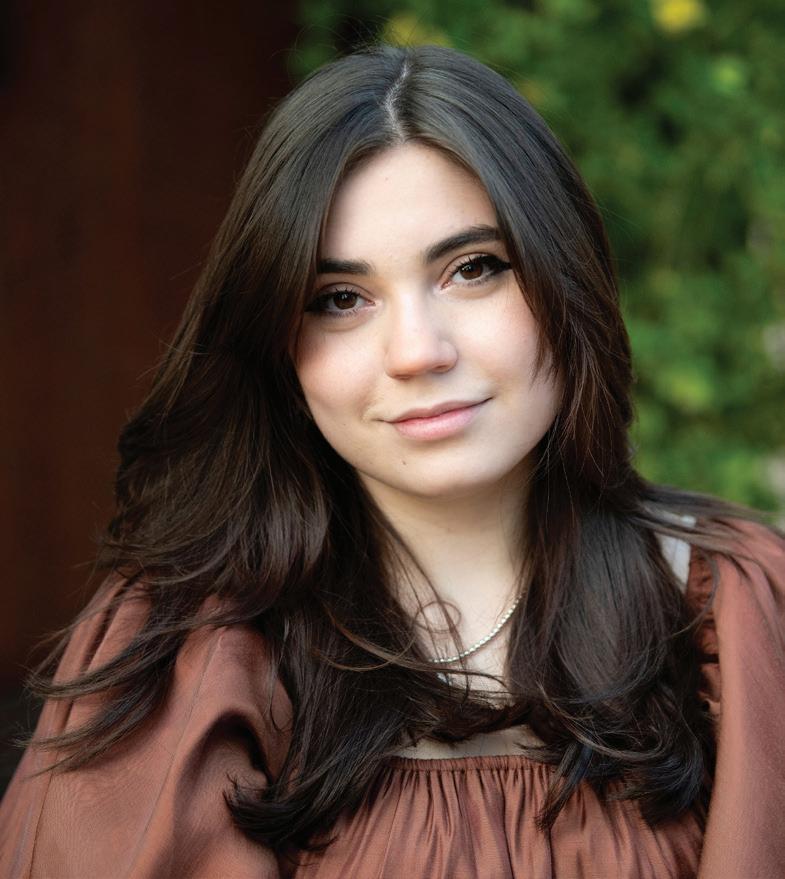

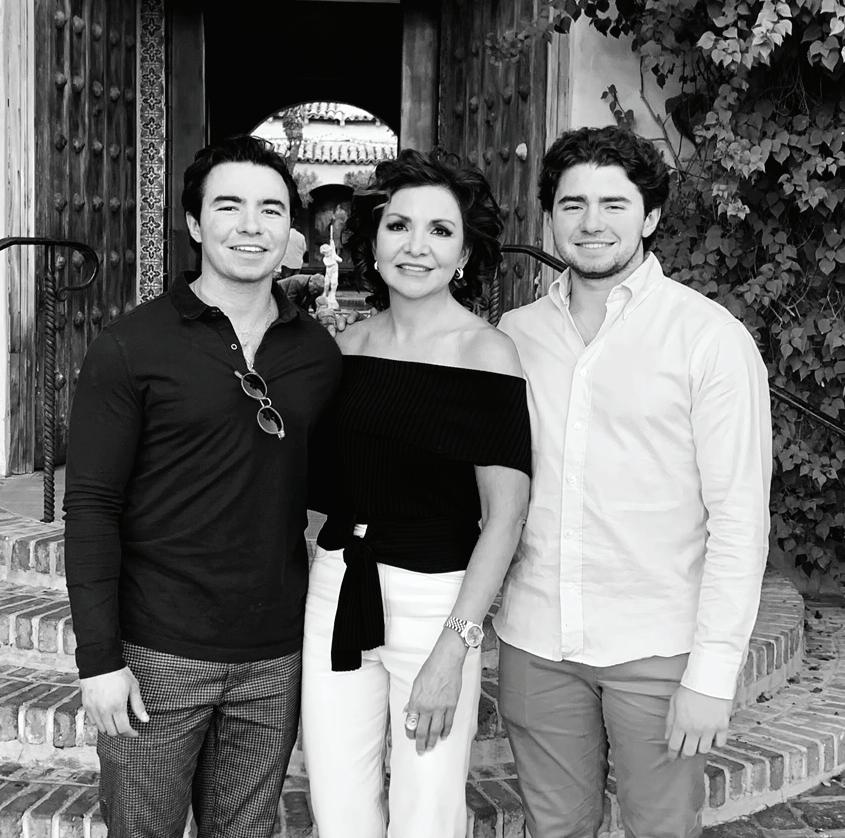
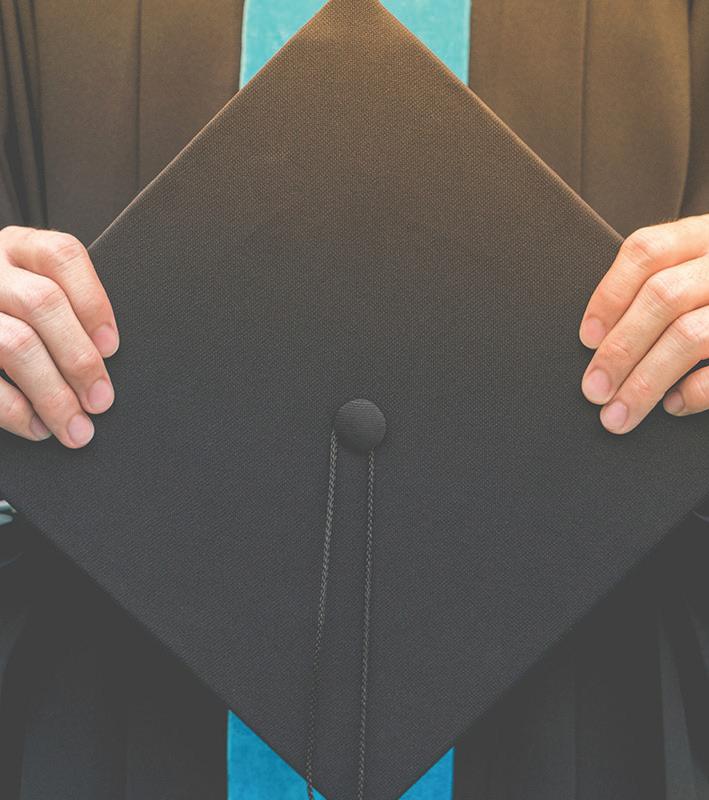
 ROSIE ROMERO, JR. | COLUMNIST
ROSIE ROMERO, JR. | COLUMNIST
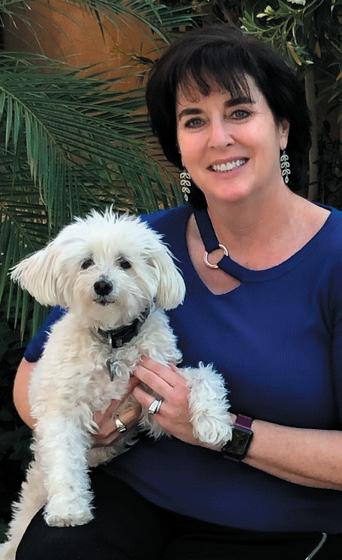
Summer is knocking on the door, which means swim season is here. In Arizona, swimming is a yearround activity, especially for our out-oftown visitors from colder climates. But for the rest of us who are desert rats, we are just starting to dip our toes in the pool. Before you take that first plunge, take the time to do some pool maintenance. These 10 tips will help you get your pool ready for summertime use:
1. Check out your pool equipment
Be sure to inspect your equipment to ensure that it is running quietly and is leak free. Check the concrete pad under the pump for wet spots. If you find a leak, call a pool leak and repair service company. It’s easier to make repairs while leaks are small.
2. Have your pool water tested
During the late fall and winter many homeowners have their pool water tested for total dissolved solids (TDS) such as calcium and minerals. Then homeowners drain their pools and refill them with clean water so the pool will respond better to chemicals during the next swimming season. If you haven’t done that, you might need to. The test and draining can be done by a pool technician. If you want to conserve water, there are companies that use reverse osmosis to clean the water without removing it.
3. Clean up
While the pool is empty, hire a professional pool service company to acid wash and polish the pool surface and tile to remove the white, hard-water ring at the water line. Pricing will depend on the size and complexity of the pool. This is also a good time to replace and maintain pool lights. Eventually, your pool may need resurfacing. The general rule of thumb is every seven years, though sometimes the surface will last much longer.
4. Inspect the amenities

Inspect handrails, diving boards, ladders and slides. Secure anything that’s damaged or needs replacing.
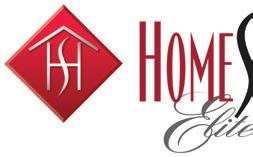
5. Check salt levels
Add salt if your pool is salt chlorinated. Also check salt levels and clean cells regularly.
6. “Shock” your pool
“Shock” your pool by raising the chlorine level if your pool is chlorinated. You can do this yourself with an oxidizer from your pool dealer. Choose a product compatible with your filter system. The shock will oxidize “dead” material killed by chlorine, such as bacteria, algae and skin cells. This should be done regularly during the swimming season, or you can invest in an ozone generator to do the job.
7. Call an electrician
To be safe, call an electrician licensed by the Arizona Registrar of Contractors (ROC) to install ground fault circuit interrupters on all outlets that power outdoor electric equipment if you haven’t already done so. Also, be sure your pool wiring, and installation are up to code.
8. Check your fences and safety features
Be sure to check your fences and safety features, including the self-closing, selflatching gate and the rescue and first-aid equipment near the pool. Update your list of emergency numbers. If you haven’t done so already, install anti-entrapment covers on your pool to meet federal requirements.
9. Weekly upkeep

Once everything is up and running, perform weekly upkeep. Devote time every week to a thorough cleaning including removing debris, vacuuming, brushing the pool down, emptying the skimmer and pump baskets and chemically treating the water. Cleaning the filter is very, very

important in summer, particularly during the monsoons when dust storms and heavy winds hit the area and can quickly turn your pool into something resembling a swamp. By the way, a green murky pool invites mosquitoes and most importantly is a safety hazard. If someone falls in and sinks to the bottom, they may not be visible until it’s too late.
10. Automated pool cleaners
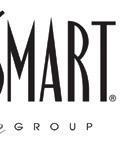
An automated pool cleaner can help you by vacuuming your pool daily. Whether you clean your pool yourself or hire professional a pool service company, it is important to clean the pool and monitor the chemicals on a weekly basis.
That way you can spend more time this summer enjoying the cool, refreshing beauty of your pool. The cost of pool service can range greatly due to the size and complexity of a pool. A tiny backyard spa would require minimal attention, whereas a negative edge pool or a pool with slides and special water features can be more costly.
Either way, whether you go the DIY route or hire a professional, start the process now so you can enjoy the pool sooner than later, and more often. JN
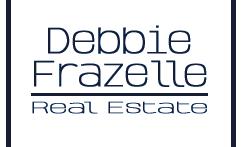
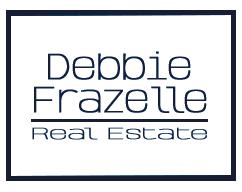

 MALA BLOMQUIST | MANAGING EDITOR
MALA BLOMQUIST | MANAGING EDITOR


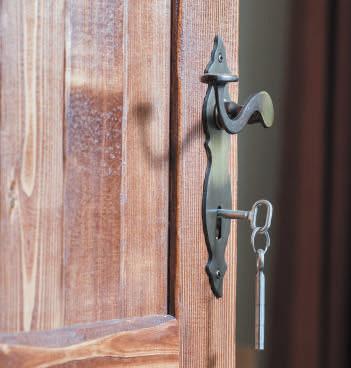


Scottsdale resident Amy Ettinger, who is Jewish, has lived in Arizona since 1976 and has become increasingly concerned about brownouts and blackouts due to excessive electricity demand on the power grid, especially during the summer. Having experienced periods with no air conditioning during power outages in the past, she was looking for a way to generate power for her home independently.

Ettinger researched generators but decided that she didn’t want to have to handle the propane, regular gasoline or diesel to keep them running and her property is too small for a wind farm, so she decided to explore solar as an option — that’s when a friend told her about Solar United Neighbors (SUN).
SUN is a nonprofit organization that works in Arizona and across the nation, holding events and education programs to help people become informed solar consumers, maximize the value of their solar investment and advocate for fair solar policies.

Ettinger spoke to several solar installation companies before she reached out to SUN, and she said her head was spinning from the discrepancies in the information she received. One company told her that she needed 10 panels on her roof and the other quoted 13, and no one would tell her exactly how long the system would run on battery power alone if the power grid went down.
She said when she talked to SUN, she was astonished by how much coaching, advice and knowledge they provided at absolutely no cost. “SUN told me to reach out to as many businesses as I wanted and narrow it down to my top three,” said Ettinger. “Then they evaluate and decipher those estimates and tell you the advantages and disadvantages of each one. They do a lot.”
When SUN returned its feedback to Ettinger, it also invited her to join a new neighborhood co-op that was opening. Co-op members can individually purchase the right system for their home based on an installer’s group rate from a vendor, which is selected after a bidding process facilitated by SUN and someone from a co-op volunteer committee. Joining the co-op does not obligate members to purchase solar.
Since 2019, SUN has hosted 14 solar co-ops in Arizona. With new federal tax incentives and a financial assistance program for low-income homeowners, the program expects to attract even more members this year.

Through the Inflation Reduction Act (IRA), participants in this year’s co-op may be able to use the solar tax credit for residential solar and save 30% on their total system cost. A similar tax credit is also available to small businesses, who can participate in the co-op.





“I’m so excited to launch this year’s

solar co-op in Phoenix, as I hear from more and more people looking for help navigating the process of going solar,” said Adrian Keller, Arizona program director for SUN. “I’m particularly looking forward to helping folks access our Solar Energy Assistance Program, so that families for whom the financial burden is just too high can also share in the benefits of power from the sun.”
Thanks to this year’s partnership with the City of Phoenix, the co-op will have funding available to help 10 low-income families install a six-kilowatt rooftop solar system (a standard household system size) at no cost.
“Phoenix has more solar per capita than any other big city, and we’re proud to connect even more residents to this cost-saving, sustainable resource through this program,” said Phoenix Mayor Kate Gallego in a statement. “The co-op helps residents navigate the installation process using an independent, verified nonprofit and this year, we’re thrilled to support 10 homeowners in low-income neighborhoods to install solar at no cost.”
Ettinger signed up to be part of the last co-op’s vendor selection committee. “It was an excellent opportunity to learn a lot more than I was learning trying to research it on my own,” she said. “Being on the committee, we selected the vendor we preferred, and I hired that vendor. So, I didn’t hire any of the five I talked to on my own.”
She said it took about eight months from when she signed the contract until going “live” using the panels and her battery. The hold up was due to supply chain issues and other delays with Salt River Project (SRP) and the city of Scottsdale.
Ettinger is thrilled with the outcome and said that she can run the internet, electrical outlets, refrigerator, microwave and a mini-split system (a heating and cooling system that allows you to control the temperature in an individual room) in her bedroom on the energy from the battery powered by her solar panels. She said the only thing she can’t run off the battery is her whole-home HVAC system and her washer and dryer.

“I have an app on my iPad and phone that shows me my consumption in real time and the different settings that you can activate during the year — maybe one setting on your battery is more advantageous than another,” said Ettinger. “So, I’ve been playing with that a lot. I wouldn’t say that I’m a gearhead but it’s satisfying something inside of me to control my own grid experience.” JN
There are two co-ops currently open to join in Arizona. The Quad Cities Solar Co-op is open to residents near Prescott, Prescott Valley, DeweyHumboldt and Chino Valley and closes to new members on May 31. The Phoenix Metro Solar Co-op is open to residents of Maricopa County, San Tan Valley and Queen Creek and closes to new members on July 7. For more information, visit solarunitedneighbors.org.

As of May 2023, the average cost of solar panels in Arizona is $2.64 per watt making a typical 6,000 watt (6 kW) solar system $11,071 after claiming the 30% federal solar tax credit now available.
This is lower than the average price of residential solar power systems across the United States which is currently $3.00 per watt.
According to data from the Solar Energy Industries Association (SEIA):
• Arizona’s national ranking: 5th (7th in 2022)
• Homes in the state powered by solar: 974,221 homes
• Percentage of state's electricity from solar: 9.86%
• Solar companies in Arizona: 368 (76 manufacturers, 171 installers/developers, 121 others)

• Total solar investment in the state: $16.1 billion
• Prices have fallen 53% over the last 10 years
• Growth projection: 7,269 MW over the next 5 years
When it comes to selling a home, first impressions matter! Buyers often make quick judgments based on the initial look and feel of a property, and that is why staging a home for sale has become an increasingly important step in the real estate process. Staging involves arranging and decorating a home in
a way that highlights its best features and creates an inviting atmosphere for potential buyers. Here are some key reasons why staging a home is crucial in today’s competitive market.
Maximizing the home’s potential Staging allows sellers to showcase the full potential of their property. By
strategically arranging furniture, adding decorative elements and decluttering, staging helps create a space that feels larger, brighter and more appealing. It enables buyers to envision themselves living in the home and helps them see how each room can be utilized effectively.
Staging provides a competitive edge in a crowded real estate market. With many similar homes available for sale, staging helps your property stand out from the rest. A staged home looks more polished and professional, making it more memorable to potential buyers. This advantage can attract more interest and potentially lead to quicker offers and higher selling prices.
Staged homes tend to sell faster and at higher prices compared to unstaged homes. A well-staged property makes it easier for buyers to mentally move in and can lead to more competitive offers. The investment in staging can yield a significant return by reducing time on the market and potentially fetching a higher selling price. A study conducted by the Real Estate Staging Association (RESA) found that professionally staged homes spent 90% less time on the market compared to non-staged homes. The study also reported that staged homes, on average, sold for 17% more than their non-staged counterparts.

In today’s digital age, the majority of home buyers begin their search online. Professionally staged homes tend to photograph better and look more appealing in online listings. Eye-catching photos and virtual tours of a staged
home can generate more interest and attract a larger pool of potential buyers. According to the National Association of Realtors (NAR) 2019 Profile of Home Staging, 83% of buyers’ agents agreed that staging a home made it easier for buyers to visualize the property as their future home. Additionally, the report revealed that 22% of sellers’ agents reported a 1-5% increase in the final sale price of staged homes compared to similar unstaged properties.



Staging a home for sale is a key tool in the home selling process. It helps maximize the property’s potential, creates a positive first impression, stands out in the market, highlights key features of the home, enhances online marketing efforts and ultimately leads to faster sales and higher returns. While the exact percentage increase may vary, the consensus among real estate professionals is that staging has a positive effect on the perceived value and marketability of a property. By presenting a well-staged home, sellers can create a desirable and inviting environment that attracts more potential buyers and often leads to more competitive offers, ultimately increasing the likelihood of achieving a higher sale price. JN
Ophir Gross is a realtor with Coldwell Banker Realty and has a combined skillset of business strategy and consumer psychology. She is a member of JNFuture Root Society, Women in Philanthropy, NowGen Phoenix, attends Congregation Beth Tefillah and began her roots in the community at the Phoenix Hebrew Academy and, formerly, Jess Schwartz High School. She can be reached at ophir.gross@ cbrealty.com or 480-794-0807.

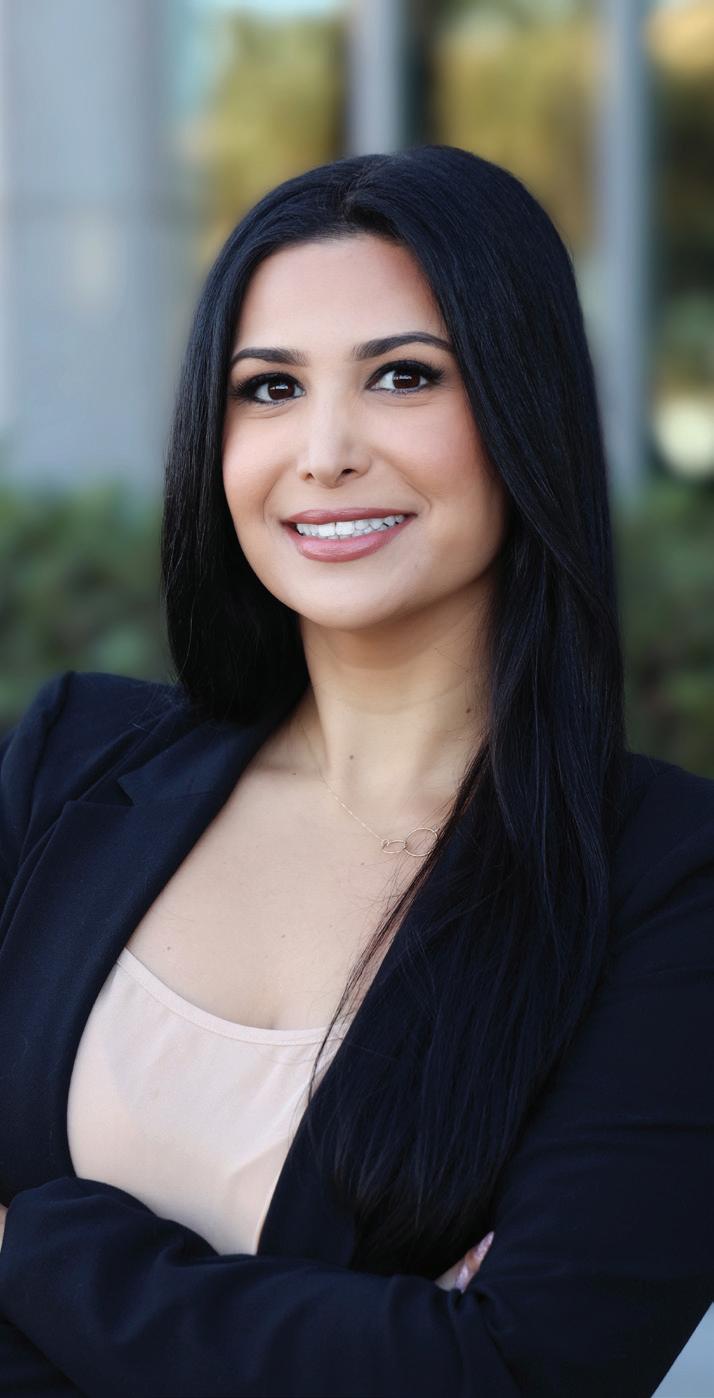
Hillel at Arizona State University Executive Director Debbie Yunker Kail (left) and Campus Rabbi Suzy Stone (right) talk to parents of Jewish teens about cultivating Jewish pride in the first of the Jewish Matters series created by the Bureau of Jewish Education of Greater Phoenix.

Arizona Jews for Justice (AJJ) volunteers take a quick photo with Eddie Chavez Calderon, AJJ campaign organizer, before taking AJJ’s “Let’s Be Better Humans” bus to deliver food and clothing to unhoused people in Greater Phoenix.

Scholar-in-residence Helen Schwartz (center), author of “Thieves of French Art,” described how the Nazis stole French art during World War II at Temple Beth Shalom of the West Valley on April 15. Also pictured are Temple Beth Shalom President Fay Henning-Bryant (left) and Rabbi Dana Evan Kaplan.

Lou Borenstein, founder of Chompie’s Restaurant, Deli, Bakery and Catering, celebrated his 91st birthday at Chase Field on Thursday, April 20. He was greeted by Arizona Diamondbacks’ manager Salvatore Anthony “Torey” Lovullo before viewing the game in a suite with his family.

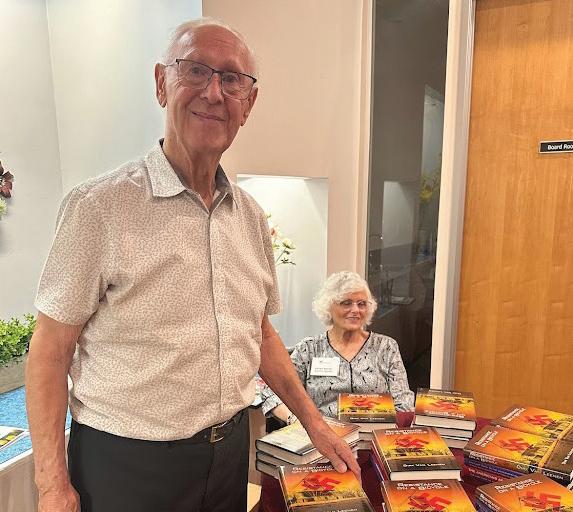
Holocaust survivor and author Dirk Van Leenen was a featured speaker at the Yom HaShoah commemoration hosted by the Center for Holocaust Education of the East Valley Jewish Community Center (EVJCC) on April 17. Karen Perna, coordinator of the EVJCC Generations After group, is seated at the table.
Jewish War Veterans Copper State Post 619 recently installed its 2023-2024 board of directors. Pictured from left are Junior Vice Commander Arthur Uram, Junior Vice Commander Buddy Greenberg, Commander Bob Brooks, Senior Vice Commander Robert Kaplan, Judge Advocate Ron Siegel and Past Commander Chuck Wolin.

Fourteen Congregation Or Tzion congregants joined Rabbi Andy and Charlene Green on an April 17-25 trip to Israel for its 75th birthday.

TZION
This COMMUNITY page features photos of community members around the Valley and the world. Submit photos and details each week to editor@jewishaz.com by 10 a.m. Monday.

Shavuot Family Celebration:
9:30 a.m. Chabad of Scottsdale, 10215 N. Scottsdale Road, Scottsdale. Join Chabad for a reading of the Ten Commandments, a children’s program and a dairy kiddush lunch. Cost: Free; RSVP required. For more information, visit chabadofscottsdale.org/shavuot.
SUNDAY, MAY 21
Celebrate Friendship 2023: 11 a.m.-12:30 p.m. The Friendship Circle, 22044 N. 44th St., Phoenix. Join Chabad’s Friendship Circle for a celebration including light refreshments, awards and a babka bake. For more information, visit fcaz.org/celebrate.
JFL’s Gratitude Gathering: 3-5 p.m. Valley of the Sun Jewish Community Center, 12701 N. Scottsdale Road, Scottsdale. Join Jewish Free Loan for its annual meeting, a special program and a reception to follow. Cost: $36 per person. For more information, visit jewishfreeloan.org.
MONDAY, MAY 22
Comfort and Flexibility in Receiving Torah: 1-2 p.m. Online. Join Valley Beit Midrash for a virtual event featuring Rabbi Sarit Horwitz discussing the ways, as we near Shavout, that we can show up to Har Sinai to accept the Torah. Cost: $18. For more information, visit valleybeitmidrash.org.
FRIDAY, MAY 26
Shavuot Dairy Dinner: 6:15 p.m. Address provided upon RSVP. Join Chabad of Paradise Valley and JPhoenix for a dairy buffet with desserts, cocktails and the Ten Commandments. Cost: Free. For more information, visit jewishparadisevalley.com.

THURSDAY, JUNE 1
Now Open: Enrollment for Adult Summer Camp: 8 a.m. Online. Join Brandeis National Committee Phoenix Chapter to start enrollment in more than 70 diverse activities taking place over the summer. Cost: $30 per individual, $40 per household. For more information, contact bncphxsummercamp@ gmail.com.
SUNDAY, JUNE 4
Israeli Film Series: All day. Online. Join the East Valley Jewish Community Center for the film, “The Pianist from Ramallah.” For more information, visit evjcc.org/film/.
THURSDAY, JUNE 8
NowGen Happy Hour: 5-7 p.m. MercBar, 2525 E. Camelback Road, Phoenix. Join NowGen for a happy hour, for Jewish adults in their 20s through 40s, to reconnect with old friends and get to know new members of the community. For more information, visit phoenixcjp.regfox.com/ nowgen-happy-hour.
FRIDAY, JUNE 9Celebrating his 50th Anniversary in the Rabbinate: 6:30-8 p.m. Online and in person. Temple Emanuel of Tempe, 5801 S. Rural Road, Tempe. Join Temple Emanuel of Tempe Rabbi Emeritus David Pinkwasser as he conducts Erev Shabbat services with Rabbi Cookie Lea Olshein.
Submit a memory and/or photo by June 5. For more information, visit emanueloftempe.org.
FRIDAY-SUNDAY, JUNE 9-11
Documentary Film Series: All day. Online. Join the Arizona Jewish Historical Society for a free online streaming of the documentary, “Converts: The Journey of Becoming Jewish.” For more information, visit azjhs.org/converts.
SUNDAY, JUNE 11
Summer Music Series: 3 p.m. Arizona Jewish Historical Society, 122 E. Culver St., Phoenix. Join the Arizona Jewish Historical Society and Red Rocks Music Festival for a concert featuring pianist-composer Tamir Handelman. Cost: $25 for AZJHS members; $36 for nonmembers. For more information, visit azjhs.org/tamir.
SUNDAYS
B.A.G.E.L.S: 9-11 a.m.; last Sunday of the month. Valley of the Sun Jewish Community Center, 12701 N. Scottsdale Road, Scottsdale. Grab a bagel and a cup of coffee at Bagels And Gabbing Every Last Sunday and enjoy some time with your friends and make new ones. You must register to attend. Bagels and coffee will be provided. Cost: Free for members, $5 for guests. For more information and to register, visit vosjcc.org.
WEDNESDAYS
Mahjong: 1-3:30 p.m. East Valley Jewish Community Center, 908 N. Alma School Road, Chandler. For all skill levels. Cost: Free; registration required at evjcc.org/ mahjong.
THURSDAYS
Storytime at Modern Milk: 9:30 a.m. Modern Milk, 13802 N. Scottsdale Road, #163, Scottsdale. Storytime for babies, toddlers and preschoolers. Integrates children’s books and songs while giving parents new ideas for play. Cost: $5. For more information and to register, visit modernmilk.com/after-baby.
SUNDAYS
Chassidus Class: 9 a.m. Online. Learn about the Chasidic movement with Rabbi Yossi Friedman. Cost: Free. For more information, visit chabadaz.com.
Jewish War Veterans Post 210: 10 a.m. Online. Any active duty service member or veteran is welcome to join monthly meetings, every third Sunday. Cost: Free. For more information, email Michael Chambers at c365michael@yahoo.com.
Sundays are for the Family Weekly Feed: 3-5 p.m. Tempe Beach Park, 80 W. Rio
Salado Pkwy., Tempe. Join Arizona Jews for Justice and AZ HUGS for the Houseless every Sunday to serve food to those in need. For more information and to RSVP, email Arizonajews4justice@gmail.com.
Anxiety in the Modern World: 6 p.m. Online. Learn the secrets of the Torah for living stress-free in the current environment with Rabbi Boruch of Chabad of Oro Valley. Cost: Free. Tune in using this link: zoom. us/j/736434666. For more information, visit chabadaz.com.
MONDAYS Ethics of Our Fathers: 7 p.m. Online. Learn with Rabbi Zalman Levertov. Tune in at: bit.ly/2Y0wdgv. Cost: Free. For more information, visit chabadaz.com.
Quotable Quotes by our Sages: 7 p.m. Online. Learn with Rabbi Shlomy Levertov. Tune in at: JewishParadiseValley.com/ class. Cost: Free. For more information, visit chabadaz.com.
Partners in Torah: 7:30 p.m. Online. Join a growing group of inspired learners with Project Inspire. Cost: Free. Tune in at: us04web.zoom.us/j/3940479736#success, password is 613. For more information, email Robin Meyerson at robin@projectinspireaz. com.
Learning to Trust in God: 7:30 p.m. Online. Learn with Rabbi Yossi Friedman. Tune in at: ChabadAZ.com/LiveClass. Cost: Free. For more information, visit chabadaz.com.
Torah & Tea: 7:30 p.m. Online. Learn with Rabbi Yossie Shemtov. Cost: Free. For more information, visit Facebook.com/ ChabadTucson.
TUESDAYS
Tuesdays at the J: 10-11:30 a.m. East Valley Jewish Community Center, 908 N. Alma School Road, Chandler. Join individuals and couples age 55 plus for presentations on a variety of topics. Cost: Free; registration required. For more information, visit evjcc. org/tuesdays.
Let’s Knit: 1:30 p.m. Ina Levine Jewish Community Campus, 12701 N. Scottsdale Road, Scottsdale. Share the pleasure of knitting, crocheting, etc. outside the social hall in the campus. Can’t knit? We can teach you! Every level welcome. Cost: Free. For more information, visit vosjcc.org.
Maintaining an Upbeat Attitude: 7 p.m. Online. A class exclusively for people in their 20s and 30s, learn how Jewish Mysticism can help with your attitude with Rabbi Shlomy Levertov. Cost: Free. Tune in at: JewishParadiseValley.com/YJPclass. For more information, visit chabadaz.com.
WEDNESDAYS
History of the Jews: 11 a.m. Online. Learn the Jewish journey from Genesis to Moshiach with Rabbi Ephraim Zimmerman. Cost: Free. Tune in here: zoom.us/j/736434666. For more information, visit chabadaz.com.
Torah Study with Temple Beth Shalom of the West Valley: 11 a.m.-12:30 p.m. Online. Weekly study group explores that week’s portion and studies different perspectives and debates the merits of various arguments. Intended for adults, Torah study is open to students of all levels. For more information, contact the TBS office at 623-977-3240.
Happiness Hour: 11:30 a.m. Online. Class taught by Rabbi Pinchas Allouche that delves into texts and references culled from our traditions to address a relevant topic. For more information or to join, visit cbtvirtualworld.com.
Torah Study with Chabad: 12 p.m. Online. Take a weekly journey of Torah with Rabbi Yossi Levertov. Cost: Free. For more information, visit chabadaz.com.
Lunch & Learn: 12:15 p.m. Online. Grab some food and learn with Rabbi Yehuda Ceitlin. Cost: Free. Get Zoom link by emailing info@ chabadtucson.com. For more information, visit chabadtucson.com.
The Thirteen Petalled Rose: 1 p.m. Online. Kabbalah class that studies “The Thirteen Petalled Rose” by Rabbi Adin Even-Israel Steinsaltz, focusing on the many concepts of Kaballah and Jewish Mysticism and applying them to everyday life. For more information or to join, visit cbtvirtualworld.com.
Finding Strength After the Loss of an Adult Child: 5-6:15 p.m. Online. Join psychotherapist Susan Charney for a grief support group for those who have lost an adult child. The group meets on Zoom the first and third Wednesday of the month. For more information, visit templesolel.org.
JACS: 7:30-8:30 p.m. Valley of the Sun Jewish Community Center, 12701 N. Scottsdale Road, Scottsdale. In person and via Zoom support group for Jewish alcoholics, addicts and their friends and family on the first and third Wednesdays of the month. Cost: Free. For more information, email jacsarizona@gmail.com or call 602-692-1004.
Words & Whiskey: 8:30 p.m. Online. Learning session for men. Cost: Free. To RSVP, email rmollenaz@gmail.com or call/ text 310-709-3901.
THURSDAYS
Ladies Torah & Tea: 10:30 a.m. Online. Learn about the women of the Torah with Mrs. Leah Levertov. Cost: Free. Tune in at: ourjewishcenter.com/virtual. For more information, visit chabadaz.com.
Talmud - Maakos: 11 a.m. Online. Learn with Rabbi Shlomy Levertov. Cost: Free. Tune in at: JewishParadiseValley.com/YJPclass. For more information, visit chabadaz.com.
Mindfulness Gatherings: 12 p.m. Online. Hosted by Hospice of the Valley via Zoom. Cost: Free. To join by phone, dial 1-253-2158782, meeting ID 486 920 2119#, to get the Zoom link or for further questions contact Gill Hamilton at ghamilton@hov.org or 602-748-3692.
The Science of Everything: 4 p.m. Online. Explore the most fundamental work of Chassidut: the Tanya, with Rabbi Boruch. Cost: Free. Tune in at: zoom. us/j/736434666. For more information, visit chabadaz.com.
Teen Discussions: 7-8:30 p.m. Online. Learn with Rabbi Tzvi Rimler. Cost: Free. Tune in at cteen.clickmeeting.com/east-valley. For more information, visit chabadaz.com.
SATURDAYS
Saturday Mindfulness Gatherings: 9:30 a.m. Online. Hosted by Hospice of the Valley. To join by phone, dial 1-253-215-8782, meeting ID 486 920 2119#. To get the Zoom link or for more information, contact Gill Hamilton at ghamilton@hov.org or 602-748-3692.
Book Discussion: 1:30-2:30 p.m. Online. Join Or Adam Congregation for Humanistic Judaism on the third Saturday of every month for a book discussion. For more information and to register, contact oradaminfo@gmail.com.
FRIDAYS
Shabbat in the Park: 10-11 a.m. Cactus Park, 7202 E. Cactus Road, Scottsdale. Join the Bureau of Jewish Education of Greater Phoenix monthly for music, parachute play, crafts and a family Shabbat experience. For more information, visit bjephoenix.org.
Welcome Shabbat: 11-11:30 a.m. Online.
Celebrate Shabbat with the JFCS Virtual Center for Senior Enrichment. Each week a different guest host will lead the program with song and celebration. Cost: Free. For more information, visit jfcsaz.org/cse.
Shabbat at Beth El: 11-11:45 a.m. Beth El Phoenix, 1118 W. Glendale. Ave., Phoenix.
Celebrate Shabbat with songs, blessings and teachings with Rabbi Stein Kokin the first Friday of every month. Special guests will be welcoming Shabbat during the remainder of the month. For more information or to join, visit bethelphoenix.com.
Erev Shabbat Service: 5:30 p.m. Online. Rabbi Alicia Magal will lead a service livestreamed for members of the Jewish Community of Sedona and the Verde Valley. Cost: Free. For more information and to obtain the Zoom link, visit jcsvv.org/contact.
Shabbat Services: 5:30 p.m. nosh, 6:15 p.m. service; morning varying dates and times. Temple Chai, 4645 E. Marilyn Road, Phoenix. For more information, contact Sheana Abrams at (602) 971-1234 or sabrams@ templechai.com.
Pre-Shabbat Kiddush Club: 6 p.m. Online. Say Kiddush with Rabbi Mendy Levertov. Cost: Free. Tune in here: ourjewishcenter. com/virtual. For more information, visit chabadaz.com.
Shabbat Services: 6 p.m; 9:30 a.m. Congregation Or Tzion, 16415 N. 90th St., Scottsdale. Services are also live streamed at otaz.org/livestream. For more information about services, events and membership, visit congregationortzion.org or call 480-342-8858.
Shabbat Services: 6:15 p.m; 10 a.m. Congregation Beth Israel, 10460 N. 56th St., Scottsdale. Services held in the Goldsmith Sanctuary. Participants must pre-register by Thursday at 5 p.m. Priority will be given to members first and then guests. If there are more requests than available seats a lottery system will be used. For more information or to make a reservation, visit cbiaz.org/ shabbat-services.
Kabbalat Shabbat and/or Shabbat morning service: 6:30 p.m.; 10 a.m.; dates vary. Congregation Kehillah, 5858 E. Dynamite Blvd., Cave Creek. Join Rabbi Bonnie Sharfman and cantorial soloists Erica Erman and Scott Leader either in person or via Zoom. For safety reasons, please register ahead of time. For dates, visit congregationkehillah.org/event/. Register by emailing info@congregationkehillah.org.
Third Friday Shabbat: 7-9 p.m. Group meets at a North Scottsdale location. The Desert Foothills Jewish Community Association hosts a Shabbat service followed by a program. Contact Andrea at 480-664-8847 for more information.
Shabbat Services with Sun Lakes: 7 p.m. Sun Lakes Chapel, 9240 E. Sun Lakes Blvd. North, Sun Lakes. Sun Lakes Jewish Congregation conducts services on the second Friday of the month. For more information, contact 480-612-4413.
Shabbat Services with Beth Ami Temple: 7:30 p.m. Gloria Christi Federated Church, 3535 E. Lincoln Dr., Paradise Valley. Rabbi Alison Lawton and Cantorial Soloist Michael Robbins lead Shabbat services twice a month. For more information, visit bethamitemple.org.
MONDAYS
Fitness Xpress Series with Zoe: 11-11:30 a.m. Online. Presented by JFCS Center for Senior Enrichment. Workout features weight and band exercises as well as yoga poses. Exercises will be demonstrated standing, but can also be done sitting in a chair. Cost: Free. For more information, visit jfcsaz.org/cse.
Sip & Schmooze: 11 a.m. milk + honey, 12701 N. Scottsdale Road, Scottsdale. Sip on kosher coffee or tea, enjoy a pastry and schmooze every second Monday of the month. RSVP appreciated to chani@sosaz. org or 602-492-7670. For more information, visit sosaz.org.
Featured Presentation: 12:30 p.m. Online. Join Smile on Seniors Mondays and Wednesdays to learn from a variety of presenters about topical issues, like Q&As with medical professionals, entertainers and lectures. Cost: Free. For more information, visit sosaz.org/virtual or email Rabbi Levi Levertov at levi@sosaz.org.
TUESDAYS
Movie Discussion Group: 11 a.m. Online. Join Smile on Seniors on the third Tuesday of every month hosted by Issy Lifshitz. Cost: Free. For full details and the movie of the month visit sosaz.org/virtual or email Rabbi Levi Levertov at levi@sosaz.org.
WEDNESDAYS
Fitness Fun with Zoe: 10-10:45 a.m. Online. Presented by JFCS Center for Senior Enrichment. Workout features light chair exercises with optional weights. Cost: Free. For more information, visit jfcsaz.org/cse.
Chair Yoga with Zoe: 11-11:45 a.m. Online. Presented by JFCS Center for Senior Enrichment. 45-minute chair yoga class. No prior yoga experience required. Cost: Free. For more information, visit jfcsaz.org/cse.
THURSDAYS
Memory Cafe: 10-11 a.m. first Thursday; 1-2 p.m. third Thursday. Online. Presented by Jewish Family & Children’s Service. Program for those with changes in their thinking or memory, mild cognitive impairment due to Alzheimer’s disease or a related disorder, along with their care partners. For more information, visit jfcsaz.org/our-services/ older-adult-services/memory-cafe/.
In the Kitchen with Benita: 12:30 p.m. Join Smile on Seniors on the fourth Thursday of every month for some delicious cooking or baking fun! Cost: Free. For full details visit sosaz.org/virtual or email Rabbi Levi Levertov at levi@sosaz.org.
FRIDAYS
Welcome Shabbat: 11-11:30 a.m. Online. Celebrate Shabbat with the JFCS Virtual Center for Senior Enrichment. Each week a different guest host will lead the program with song and celebration. Cost: Free. For more information, visit jfcsaz.org/cse.
Sit or Stand Ballet Class: 12-12:45 p.m. Online. Presented by JFCS Center for Senior Enrichment. Jennifer Cafarella Betts and Friends from Ballet Theatre of Phoenix teach this class. Grab a chair or you can stand next to a chair or counter. Cost: Free. For more information, visit jfcsaz.org/cse.
Musical Friday: 12:30 p.m. Online. Join Smile on Seniors on the first Friday of every month for a musical presentation. Cost: Free. For full details visit sosaz.org/virtual or email Rabbi Levi Levertov at levi@sosaz.org. JN
For sale: 1 Companion Plot Solomon Section
Burial plot for 2 people and: Stone Monument, 2 engravings, 2 open and close fees, Concrete vault liner, Full Perpetual care.
Original cost $15,105.79
Will accept best offer. abbey@goldbergaz.net
Bernard Laezman of Lincoln, California died on April 6, 2023. He was 91. Bernard and his family resided in Phoenix from 1964 to 1976.
He was born in Pittsburgh, Pennsylvania and served in Korea as a major in the U.S. Army.
Bernard is survived by his wife, Elaine; daughters Julie Heath, Jeannie Laezman and Debie Laezman; son, Rick Laezman; six grandchildren and two great-grandchildren. Services were held on April 12, 2023, at Sunset Lawn Chapel of the Chimes in Sacramento, California and officiated by Rabbi Seth Castleman. JN
Richard H. Bernstein passed peacefully on May 6, 2023.
Born in Brooklyn, New York in 1935, Richard attended James Madison High School, the University of Pennsylvania and Columbia University Law School. He spent his career as a lawyer in New York before retiring to Scottsdale, where he served as a board member of the AntiDefamation League and a volunteer for the McDowell Sonoran Conservancy.
He is survived by his wife, Eva, his three children and six grandchildren.
Donations in his memory can be made to the Anti-Defamation League.
Beloved wife, mother, grandmother, sister-in-law, aunt, cousin and friend Sherry Lynn Lato (Rubin) of Scottsdale, passed away on May 9, after suffering a series of strokes.
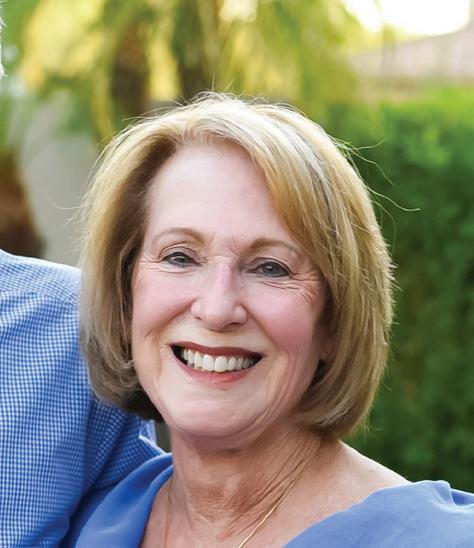
Sherry was born on May 10, 1951, in St. Louis and ventured to the University of Arizona for college where she met her husband of 50 years, Marc, with whom she raised their daughter, Traci. Sherry was a force of love and caring in the world and is remembered for her love of family, dogs, horses, community and most of all, her precious grandchildren Max and Asher. Her strength was inspiring to the very end.
Services were held at Sinai Mortuary in Phoenix on Friday, May 12, with a graveside service and burial at Beth El Cemetery.
